Ron Jennings grew up in Los Angeles, however he’s all nation, proper all the way down to his cowboy hat and folksy twang.
The 42-year-old smiles when recounting the unusual appears to be like he received from fellow passengers throughout bus rides to his grandfather’s horse steady in Gardena or to take part in rodeos at Griffith Park when he was a teen.
The cowboy hat, the bell clanging towards the rodeo gear in his bull bag — he got here throughout as an oddity within the metropolis, much more so as a result of he’s Black.
In Oakdale, Calif., many teams of Black horse riders carry their steeds and households, rejoice the traditions of the Outdated West, and discover their roots with American cowboy life.
Reactions had been completely different when he rode horses down Crenshaw and Martin Luther King Jr. boulevards or to Leimert Park. Neighbors excitedly waved and honked their horns as he moseyed alongside lowriders.
Now Jennings operates a youth bull driving academy at his residence in Jurupa Valley, and his 12-year-old son, Andrew, is a rising rodeo star in his personal proper.
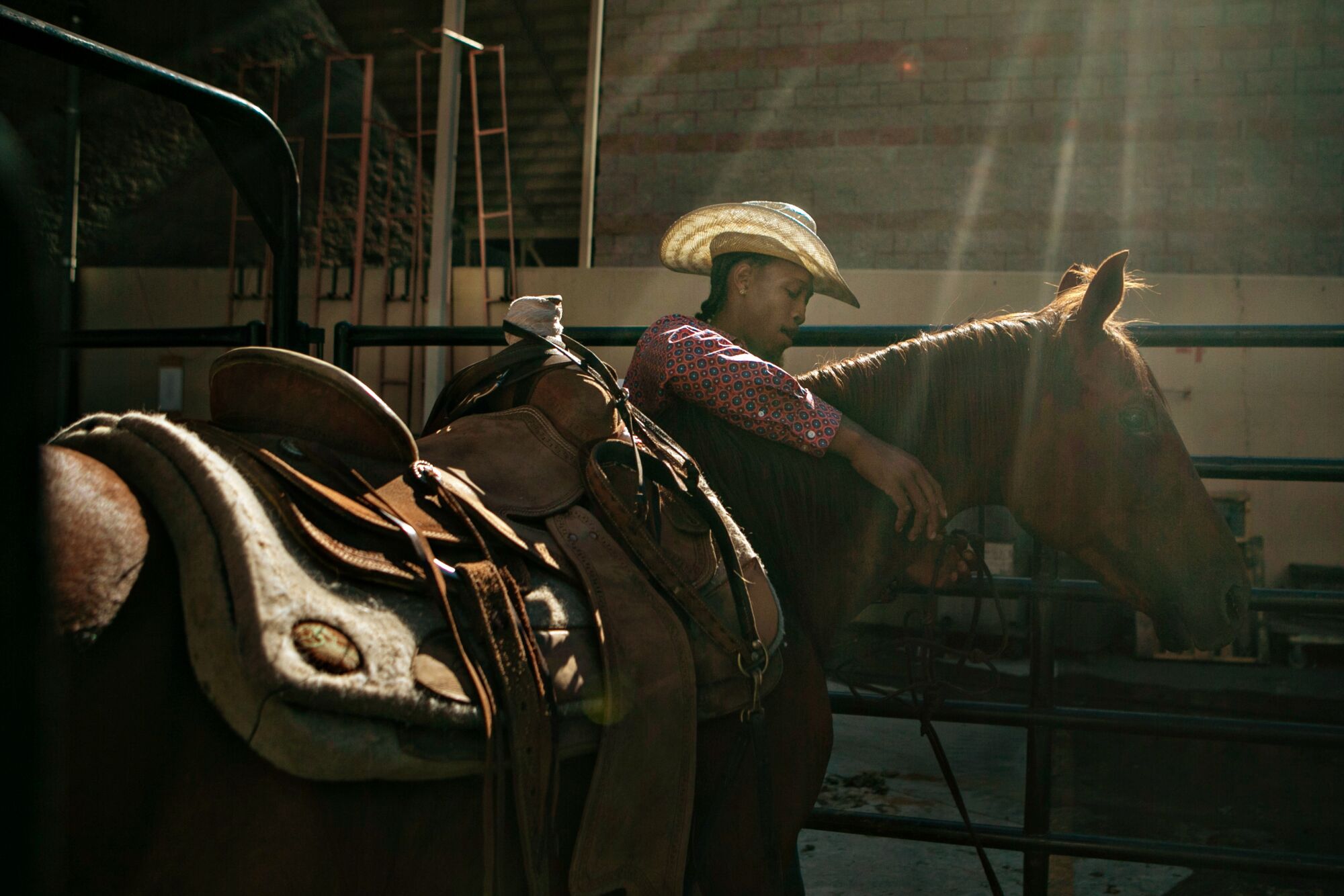
A cowboy with the Invoice Pickett Invitational Rodeo prepares a horse to be loaded right into a trailer after an occasion in Las Vegas. The rodeo celebrates the wealthy legacy of Black equestrians and bull riders.
(Jason Armond / Los Angeles Instances)

As a Black man in America, I’ve all the time struggled to embrace a rustic that promotes the beliefs of justice and equality however by no means absolutely owns as much as its darkish historical past of bigotry, inequality and injustice.
Now, greater than any time in latest historical past, the nation appears divided over this enduring contradiction as we confront the space between aspiration and actuality. Be a part of me as I discover the issues that bind us, make sense of the issues that tear us aside and seek for indicators of therapeutic. That is a part of an ongoing collection we’re calling “My Nation.”
— Tyrone Beason
Rising up, I couldn’t consider a extra highly effective image of the American West than a white man along with his horse: Clint Eastwood as cattle driver Rowdy Yates, staring me down along with his icy gaze. The Lone Ranger crusading towards injustice on his stallion Silver. President Reagan — a former B-movie cowboy — placing iconic poses for the press in his hat, denims and boots at his ranch exterior Santa Barbara.
I wasn’t taught concerning the Black rodeo athletes, path riders, ranchers and horse trainers who, like Jennings at present, draw power from the identical traditions that Hollywood made me fall in love with.
Black cowboys and cowgirls are lastly getting their second to shine within the mainstream.
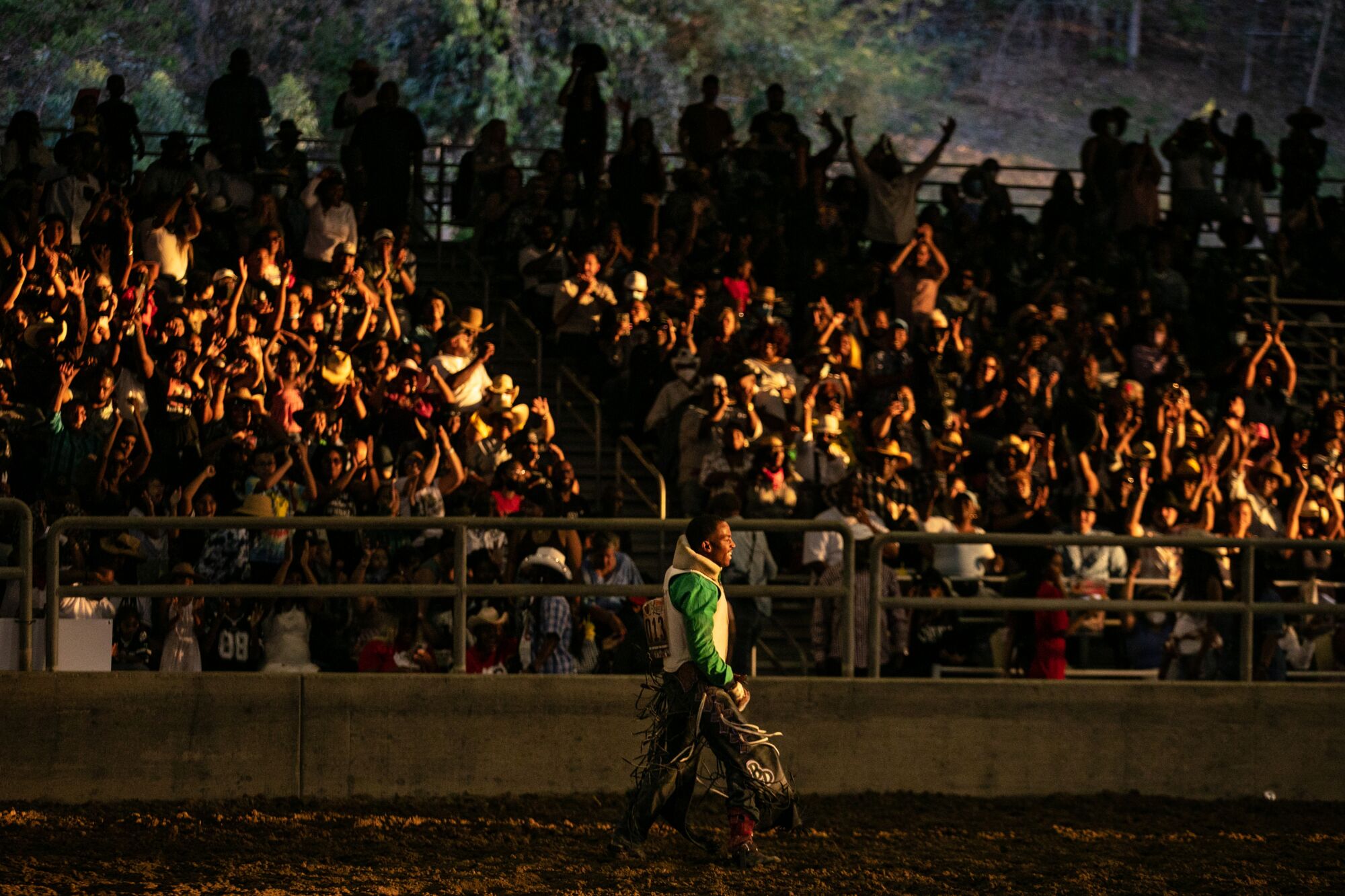
The viewers cheers after a cowboy’s efficiency on the Invoice Pickett Invitational Rodeo in Metropolis of Trade.
(Jason Armond / Los Angeles Instances)
The latest movies “Nope,” “The More durable They Fall” and “Concrete Cowboy” have burned photos of Black ranchers, settlers and riders into the general public’s consciousness.
Pop stars like Lil Nas X, Beyoncé and her sister, Solange, who rejoice nation and western tradition’s Black roots of their music and movies, have imbued it with a sure hip issue.
Skilled rodeo athletes like Shad Mayfield, a cattle roper who’s ranked among the many greatest on this planet, make up a brand new legion of function fashions for Black kids.
On the Invoice Pickett Invitational Rodeo’s newest cease in Metropolis of Trade east of Los Angeles, not solely are the entire cowboys and cowgirls Black — so are many of the 3,500 spectators.
A number of demonstrators chant and wave indicators exterior the sector to protest a sport that many Californians think about merciless to animals. The followers file previous the protesters, seemingly unfazed. Some describe the nation’s largest touring Black rodeo as akin to a cultural celebration — and a sort of homecoming.
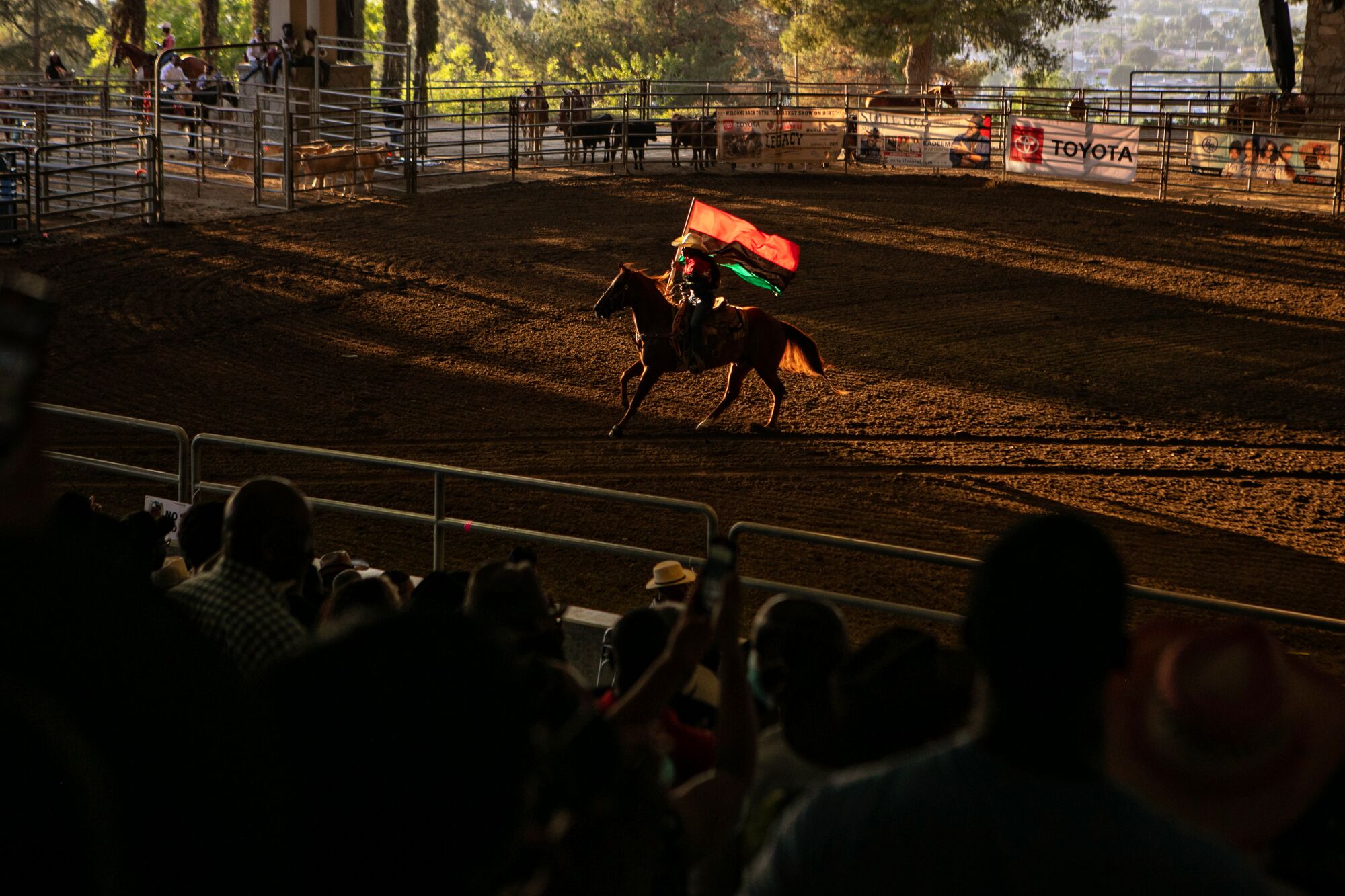
A cowgirl carries the Pan-African flag on the opening of the Invoice Pickett Invitational Rodeo in Metropolis of Trade. All the rodeo’s individuals and most of its spectators are Black.
(Jason Armond / Los Angeles Instances)
The night will get underway with horseback riders trotting into the sector. Sunbeams radiate behind them.
Some, carrying western shirts with suede tassels and reptile-print boots, elevate their chins like kings and queens. One carries a little bit boy on his lap who’s sucking a pacifier; the toddler wears a T-shirt that reads, “Future cowboy.”
When Ray Charles’ “America the Stunning” blasts from loudspeakers, one lady raises her palms from her horse’s reins, appears to be like joyously to the sky and lip-syncs each line.
The air smells of catfish frying and barbecue simmering. Distributors dish out Philly-style ice treats and peach cobbler baked the Deep South approach, with pecans.
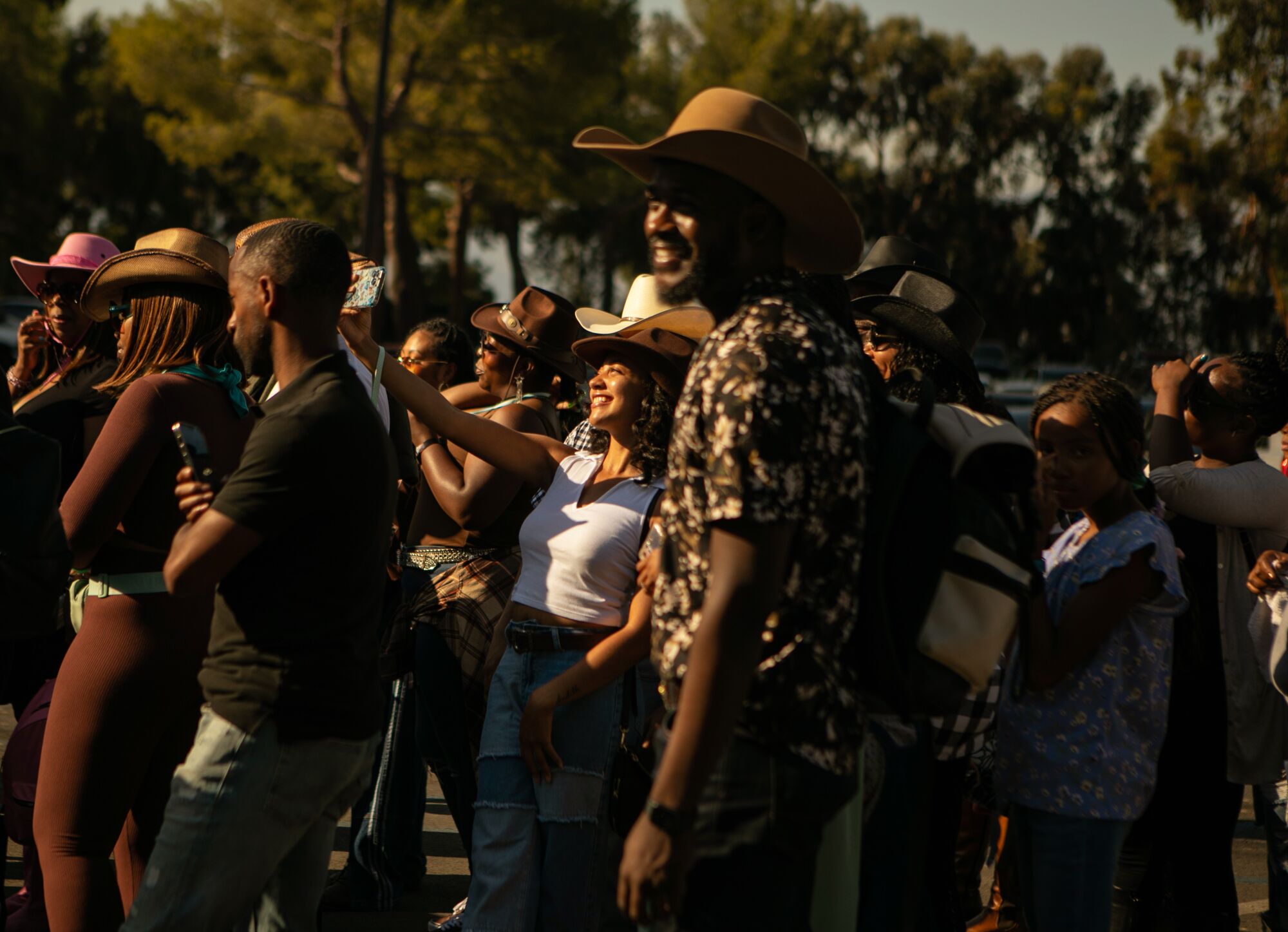
Followers line as much as enter the Invoice Pickett Invitational Rodeo in Metropolis of Trade. “There’s nothing like the sensation of celebrating this way of life round individuals who seem like you,” says Kairis Chiaji, a member of Loyalty Riderz, a path driving membership based mostly close to Sacramento.
(Jason Armond / Los Angeles Instances)
The group cheers as L.A. musician Howard Johnson will get down on each knees throughout his rapturous rendition of “Carry Each Voice and Sing,” often known as the “Negro nationwide anthem.” The viewers grooves to Tupac Shakur and Dr. Dre’s “California Love” as riders file out to make approach for bull driving, calf roping, barrel racing and different competitions.
There’s one thing particular about Black individuals coming collectively to revel on this heritage, says Kairis Chiaji, 51, of the Loyalty Riderz, a Black path driving membership exterior Sacramento.
“In these areas,” Chiaji says, “it’s protected to be us.”

It was arduous to hide my amazement whereas attending the Invoice Pickett rodeo final yr on the MGM Grand area in Las Vegas — the primary time the occasion had been nationally televised in its 40-year historical past.
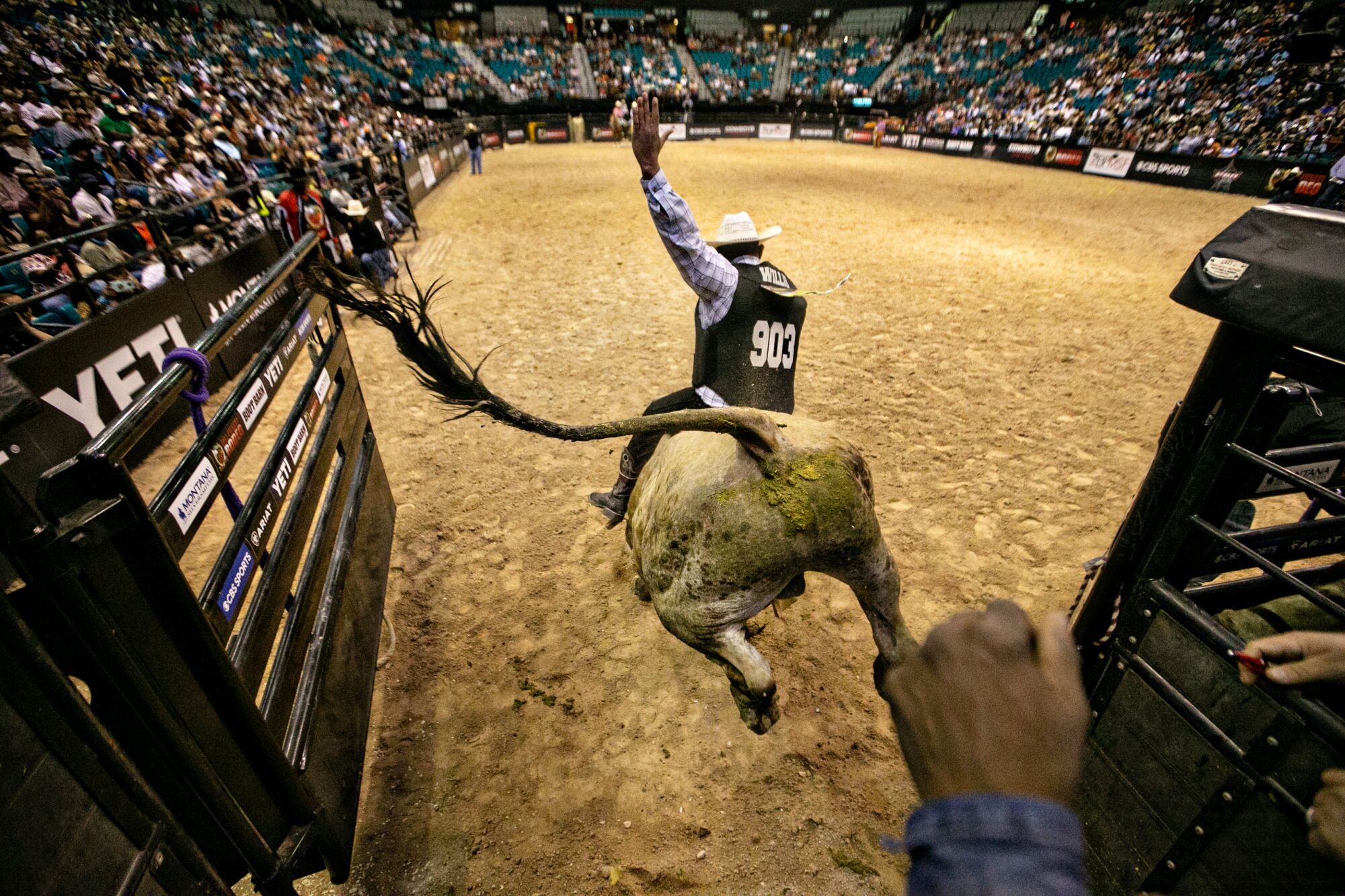
Justin Willis holds on tightly as his bull erupts from a chute on the Invoice Pickett Invitational Rodeo in Las Vegas.
(Jason Armond / Los Angeles Instances)
The scenes had been nearly an excessive amount of to soak up: The horseback rider waving the black, crimson and inexperienced flag of Black liberation. The Black cowboys and cowgirls driving tall within the saddle for the entire nation to soak up their glory. The Black rodeo clown who stole the present along with his jokes and exaggerated Southern drawl.
Then got here the principle occasions. Lamontre Hosley, one of many fabled Compton Cowboys, thrilled the gang on a bucking bronco for seconds that felt to me like agonizing minutes. In barrel racing, Black ladies on horseback sprinted at breakneck velocity, plucking flags from every impediment they circled.
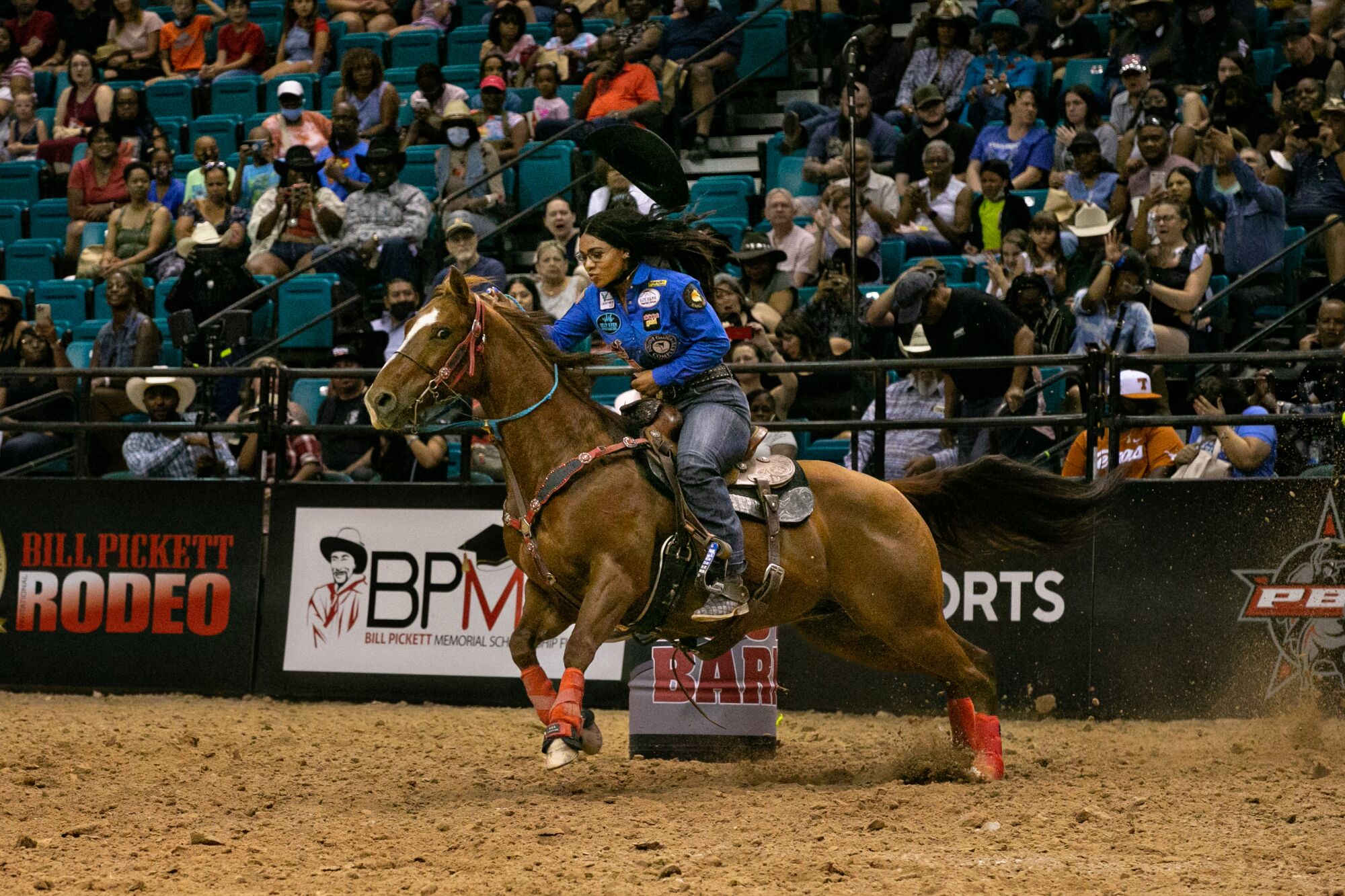
Aleeyah Roberts and her horse compete within the barrel race in Las Vegas.
(Jason Armond / Los Angeles Instances)
Invoice Pickett was one of many best Black bull riders of the Outdated West, and his likeness stands amongst actual and fictional white cowboys on a mural on the Autry Museum of the American West at L.A.’s Griffith Park.
Backstage in Vegas had been legends from our time. L.A. native Charlie Sampson, who in 1982 grew to become the primary Black man to win a world championship in bull driving, mingled with youthful opponents. One of many emcees, actor and Southern California ranch proprietor Glynn Turman (“The Wire,” “Ma Rainey’s Black Backside”), shared childhood reminiscences of driving horseback in New York’s Central Park.
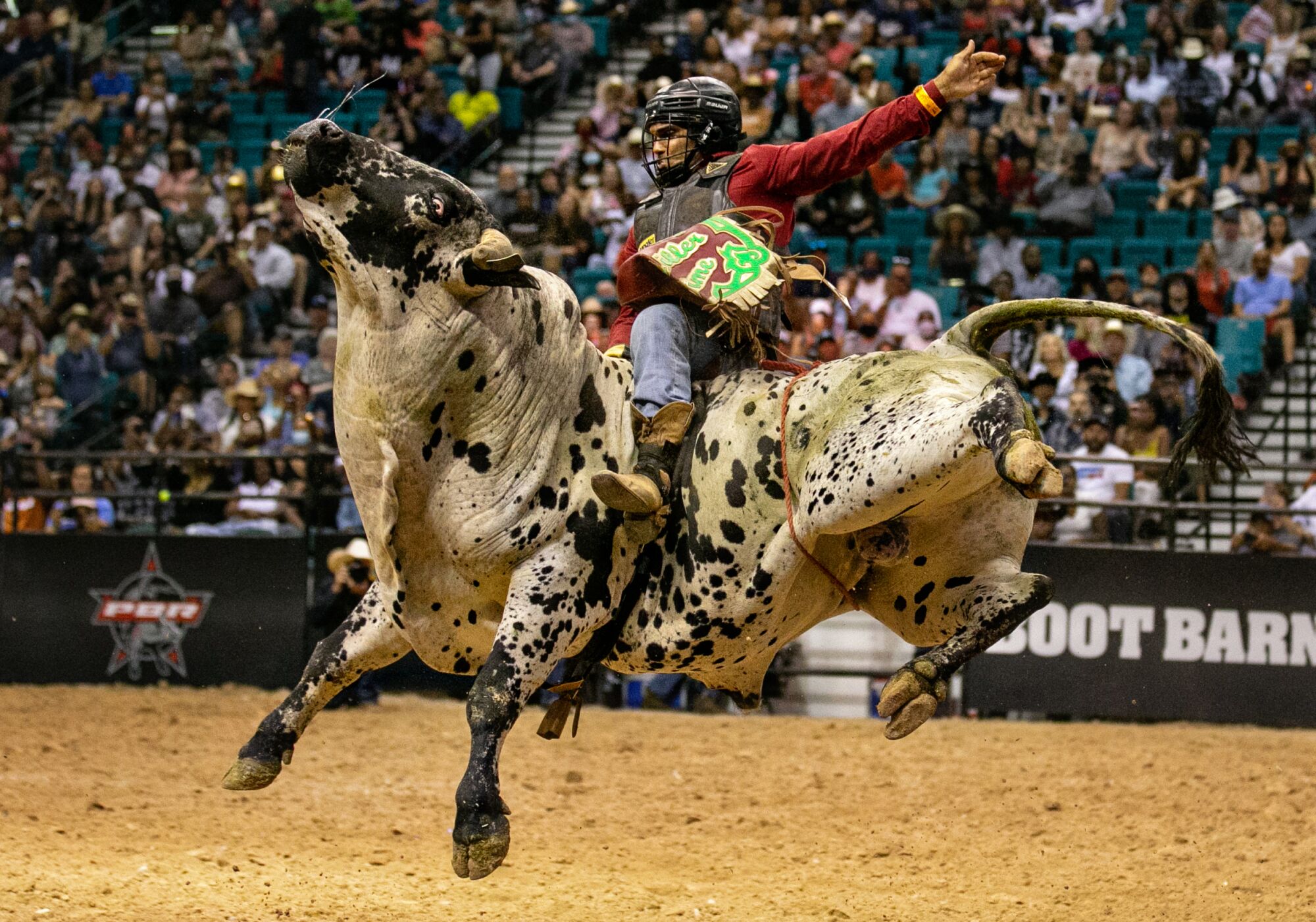
Jay Miller of Liberty, S.C., rides Hulk the bull on the Vegas rodeo.
(Jason Armond / Los Angeles Instances)
“Sadly, in our tradition, in American tradition at giant, there’s a monolithic view of what Black individuals do and don’t do,” says historian Tyree Boyd-Pates, an affiliate curator on the Autry Museum. “The second you see a Black man, or lady or baby, on a horse, it’s a departure from what we count on.”
The time period “cowboy” itself has roots in America’s legacy of racism.
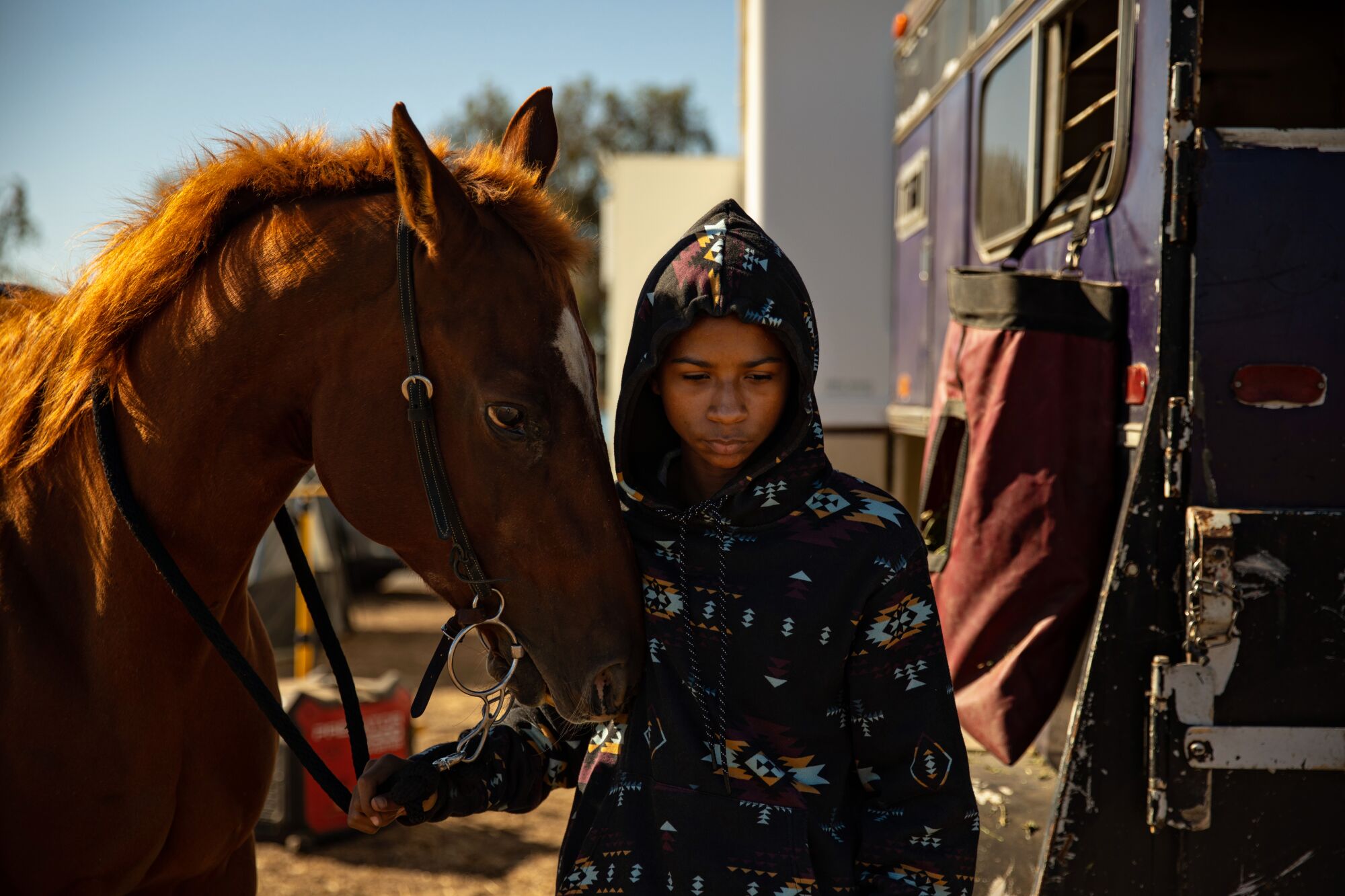
Sylvester Miller of Stockton and his horse at a campout for members of Black path driving golf equipment.
(Jason Armond / Los Angeles Instances)
It originated as an epithet used to demean Black cattle drivers and ranch palms, who made up as a lot as 1 / 4 of all such employees within the Southwest within the late 1800s, says Boyd-Pates.
When Black males name themselves “cowboys” and Black ladies seek advice from themselves as “cowgirls,” Boyd-Pates says, they take satisfaction in having the ability to rework a painful historical past into one thing they’ll glorify.

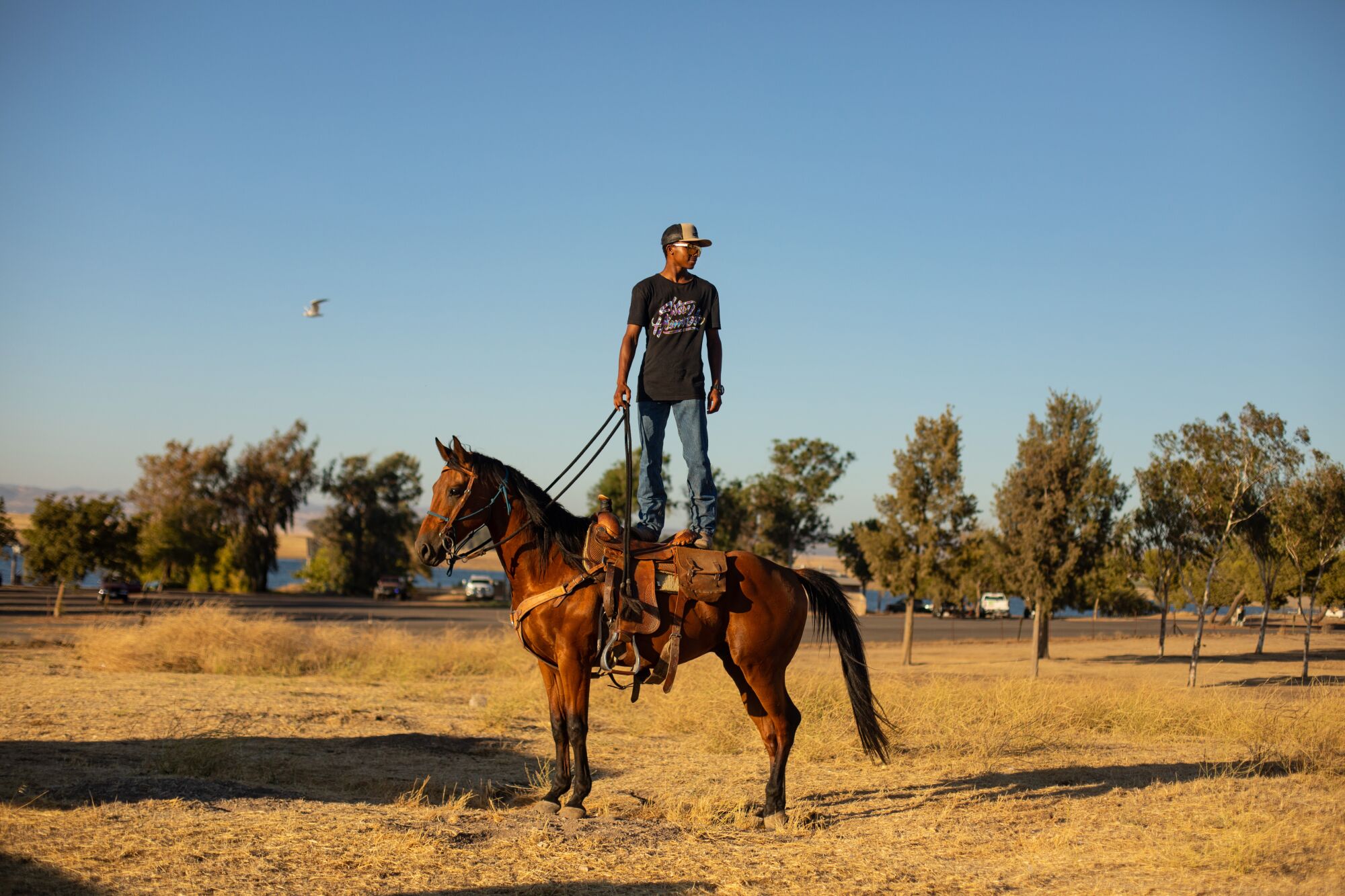
A cowboys checks the view from atop his horse after a path trip close to Oakdale, Calif.
(Jason Armond / Los Angeles Instances)
Racial satisfaction can also be on full show among the many Black ranchers, path riders and horse trainers who dwell within the countryside south of Sacramento.
“We’re the unique cowboys, and the world is waking as much as that,” says Greg Bradley Sr., president of the Loyalty Riderz membership. Some members attended the rodeo in L.A.
One late afternoon, Bradley, Chiaji and different riders collect below a shade tree on the ranch owned by two fellow members, Zena and Frederick Perres. Horses putter round within the gently rolling area behind the Perres’ small home.
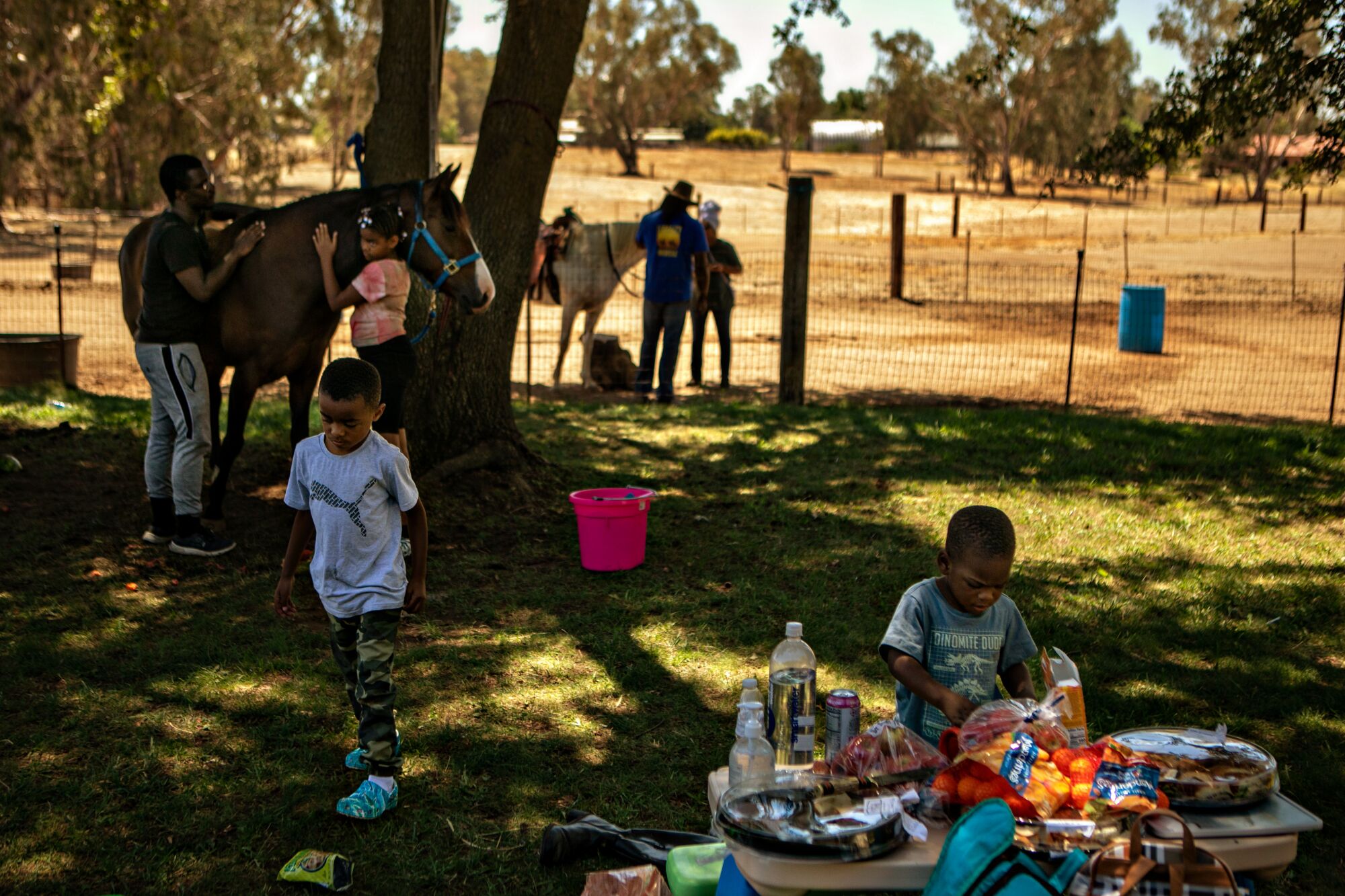
Zena and Freddy Perres of the Loyalty Riderz open their ranch exterior Sacramento to assist introduce a brand new era to Black cowboy tradition.
(Jason Armond / Los Angeles Instances)
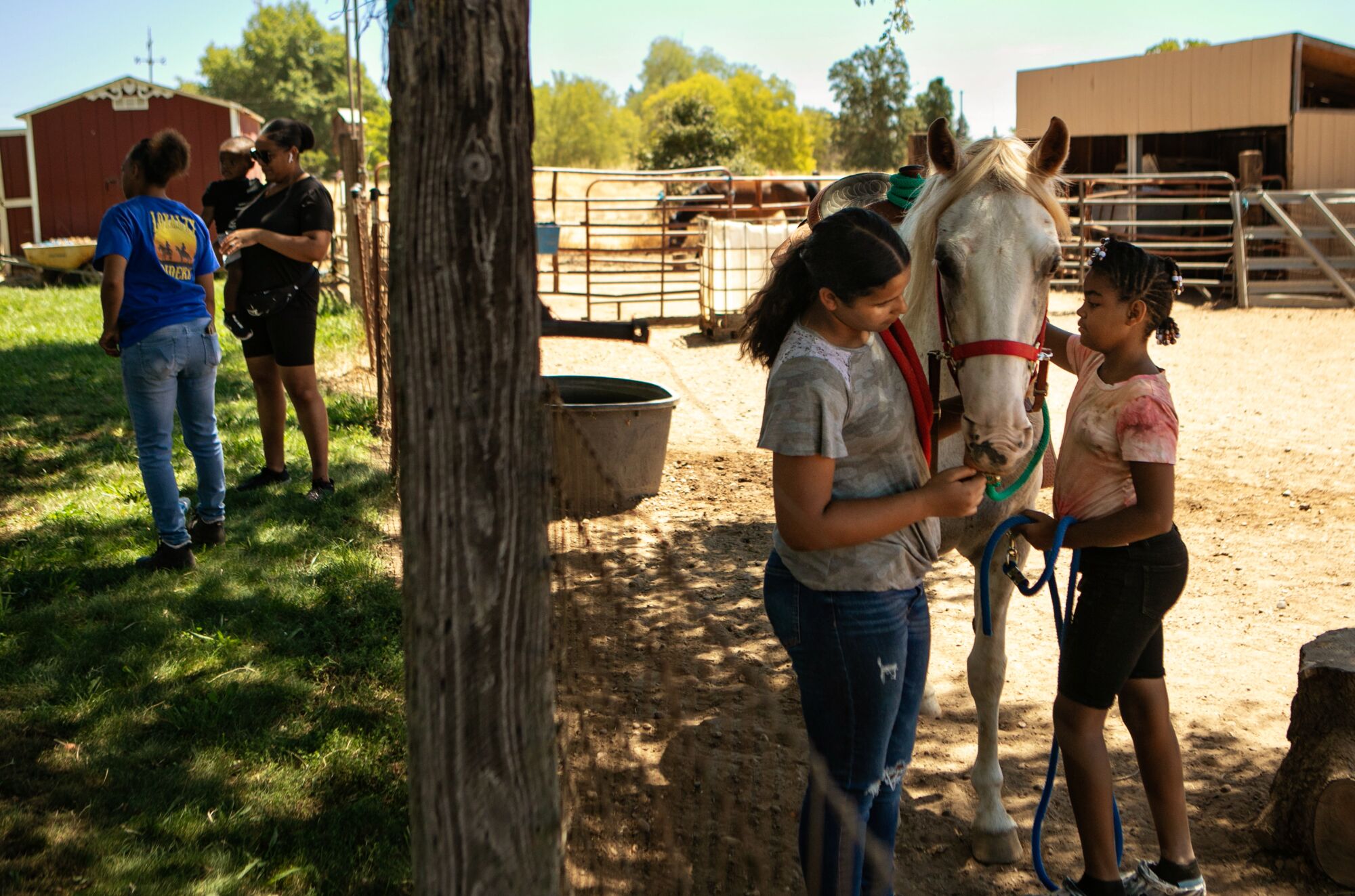
Jayla Woodard, left, and a buddy look after a horse on the Perres ranch.
(Jason Armond / Los Angeles Instances)
Bradley, 67, a retired Sacramento County worker, is called “Massive G” amongst fellow riders. He’s initially from Marlon, Texas, the place his father owned a 500-acre ranch.
Most of these gathered categorical a willpower to reveal Individuals to a different aspect of the West — and the Black expertise.
“What’s televised about our tradition, it’s all the time unfavorable — Black-on-Black murders,” says Byron Levy, whose spouse, Michelle, additionally rides with the membership. “However none of that is ever televised — how we get along with 4 or 5 hundred Black cowboys and cowgirls and there’s no incidents … Al Sharpton don’t have to point out up.”
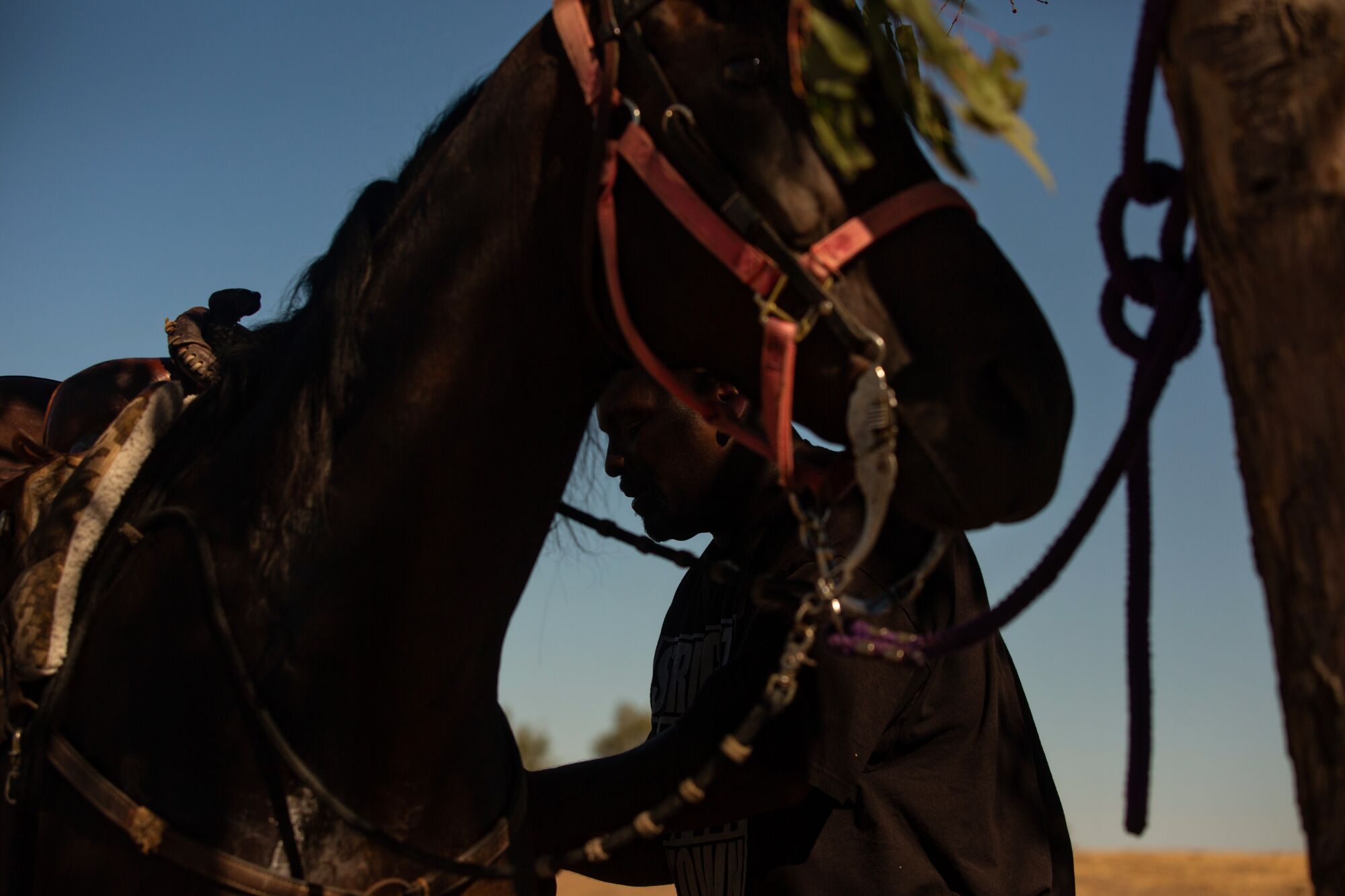
Jamison Sadler prepares his horse for a path trip exterior Oakdale.
(Jason Armond / Los Angeles Instances)
On a Saturday morning, horses chunk into melon halves within the yard of the Perres residence whereas school-age guests from Sacramento who’ve by no means earlier than seen a horse in actual life timidly pet the animals’ cheeks and foreheads.
Out entrance, a lady returns from a horseback trip, her towering white headwrap gleaming within the solar.
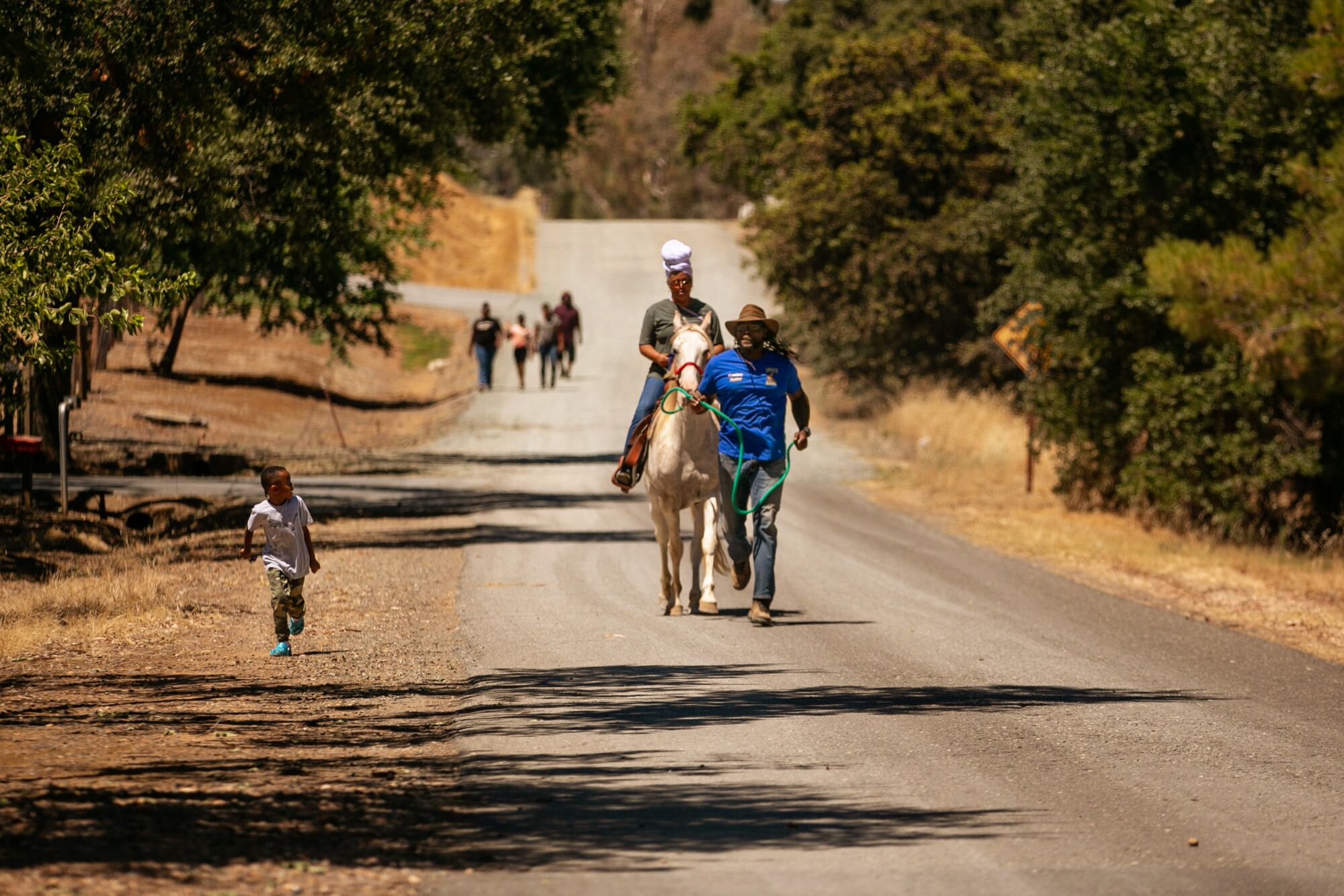
J.R. Johnson, a member of Loyalty Riderz, leads company on outings along with his horse Whispers on the Perres ranch. Johnson says having a horse of his personal makes him really feel “like a king.”
(Jason Armond / Los Angeles Instances)
Just a few miles away in Elk Grove, Brittney Chambers and her sister Christalle Chambers wrangle with a cussed horse at CBC Therapeutic Horseback Using Academy.
They really feel a private connection to the historical past of Black equestrians.
“Black individuals had been trainers on the racetrack. We had been the jockeys. We did every thing,” says Brittney Chambers, 32, who based the academy seven years in the past.
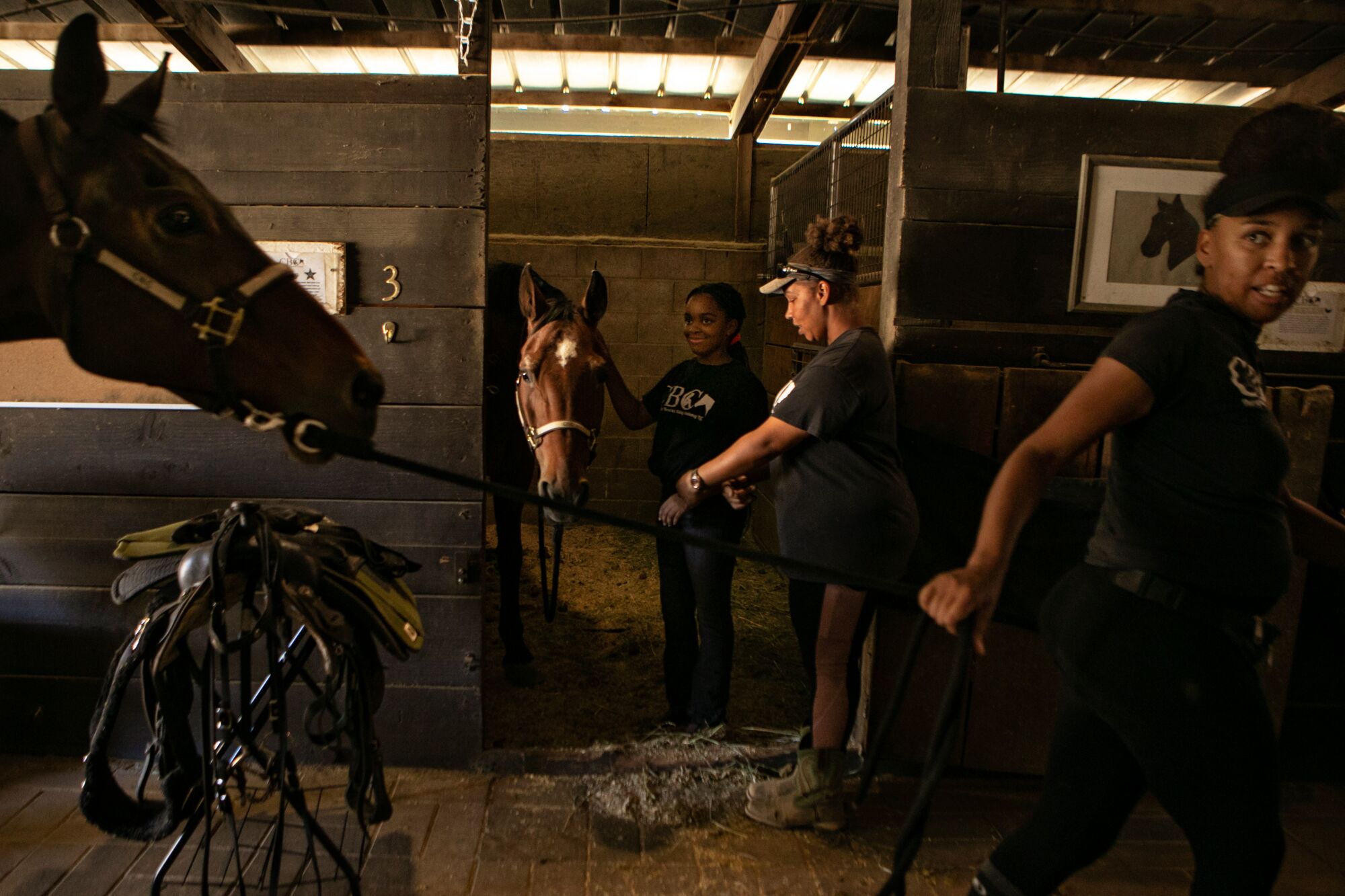
Brittney Chambers, proper, leads her horse again to its stall whereas sister Christalle Chambers and pupil Ayvalyn Gorman work with one other horse at CBC Therapeutic Horseback Using Academy.
(Jason Armond / Los Angeles Instances)
When she was little, Chambers dreamed of changing into the primary Black lady on the U.S. Olympic equestrian workforce. “There nonetheless hasn’t been one!” she says.
The sisters felt so alone and unwelcome each time they’d tag together with their father, a horse coach, to predominantly white equestrian occasions within the Sacramento space.
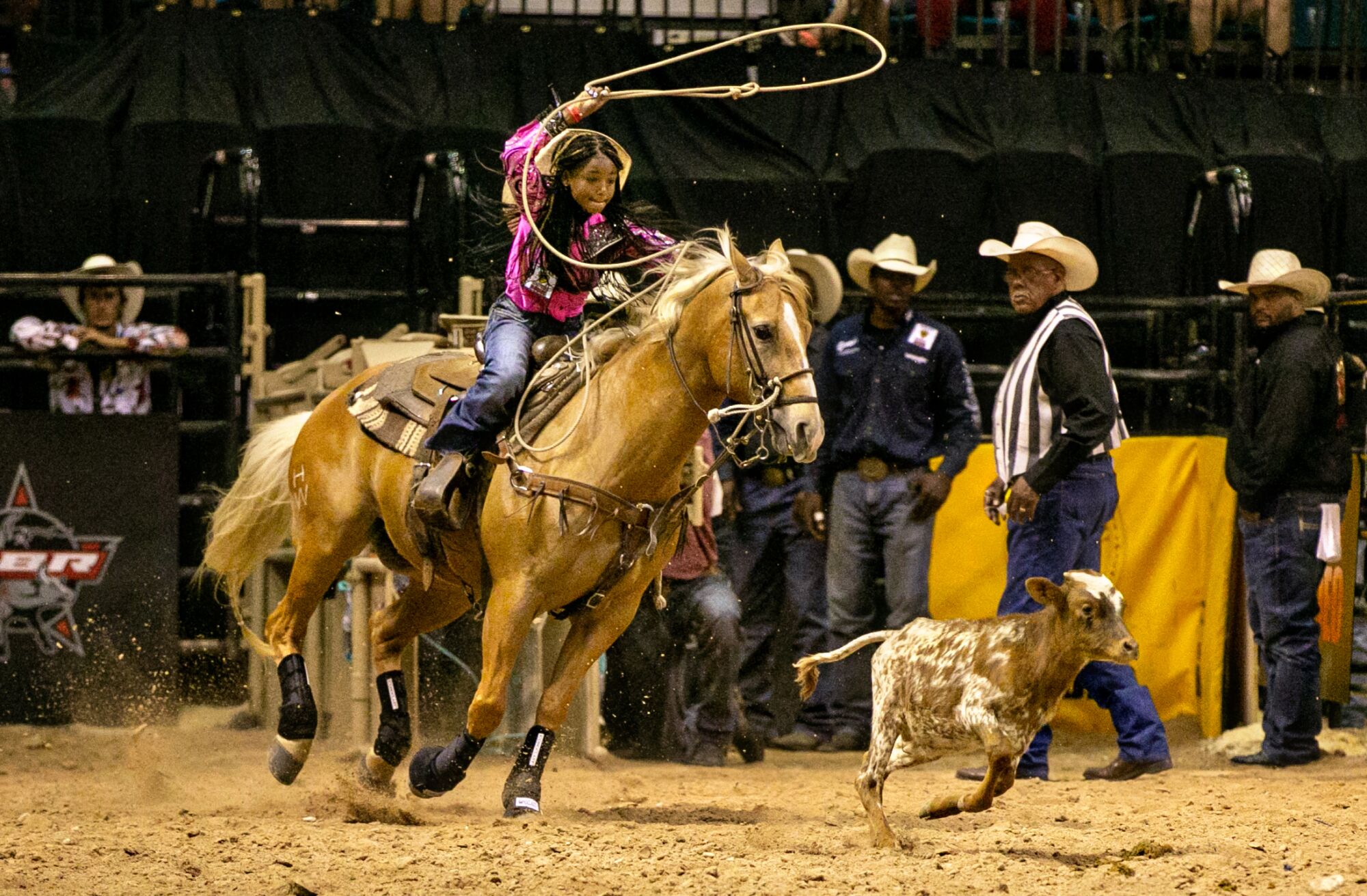
Kortnee Solomon and her horse shut in on a working calf on the Invoice Pickett Invitational Rodeo in Las Vegas.
(Jason Armond / Los Angeles Instances)
Now they function an inspiration for Black riders, lots of whom come as a result of they know the sisters will perceive how racial experiences have an effect on their well-being and their capability to bond with horses.
Troy Jackson, a Black rancher who lives just a few miles from the academy, sounds charmed when speaking concerning the serenity and peace he experiences on horseback.
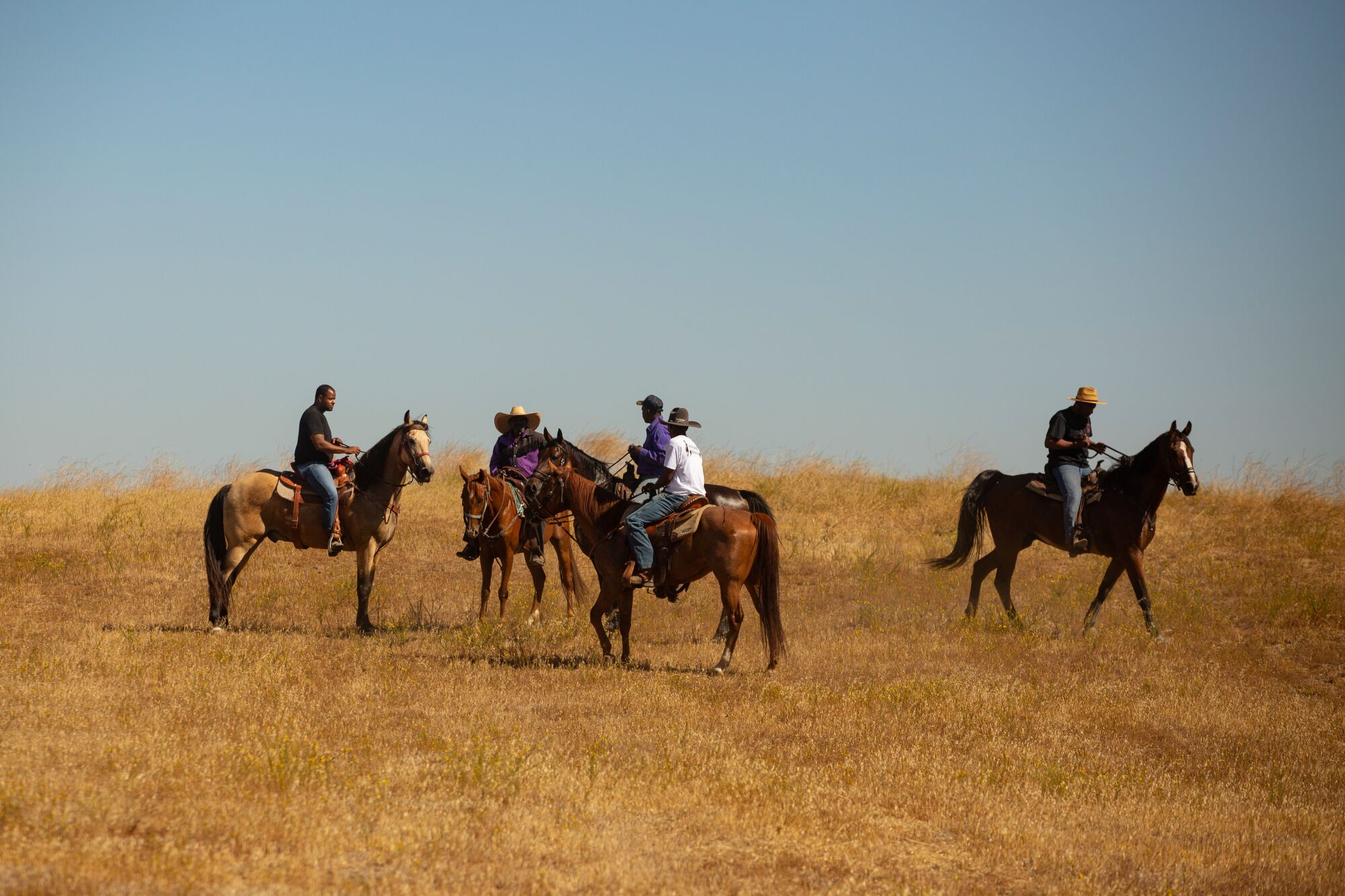
Riders regroup on a hill after being separated throughout a path trip exterior Oakdale.
(Jason Armond / Los Angeles Instances)
“While you’re on the market, you’re free and issues simply move,” he says. “It’s non secular. It turns into part of who you’re.”
Jackson’s property sits on the finish of a protracted gravel driveway lined with horse pastures within the no-stoplight city of Wilton. It’s the house base for one more driving membership, the Wiltown Riders.
Jackson, 57, relaxes on a garden chair subsequent to his man-made fishing pond one night. Some Wiltown Riders, together with his spouse, Vicki, play dominoes, sip beer, hearken to soul music and swap tales.
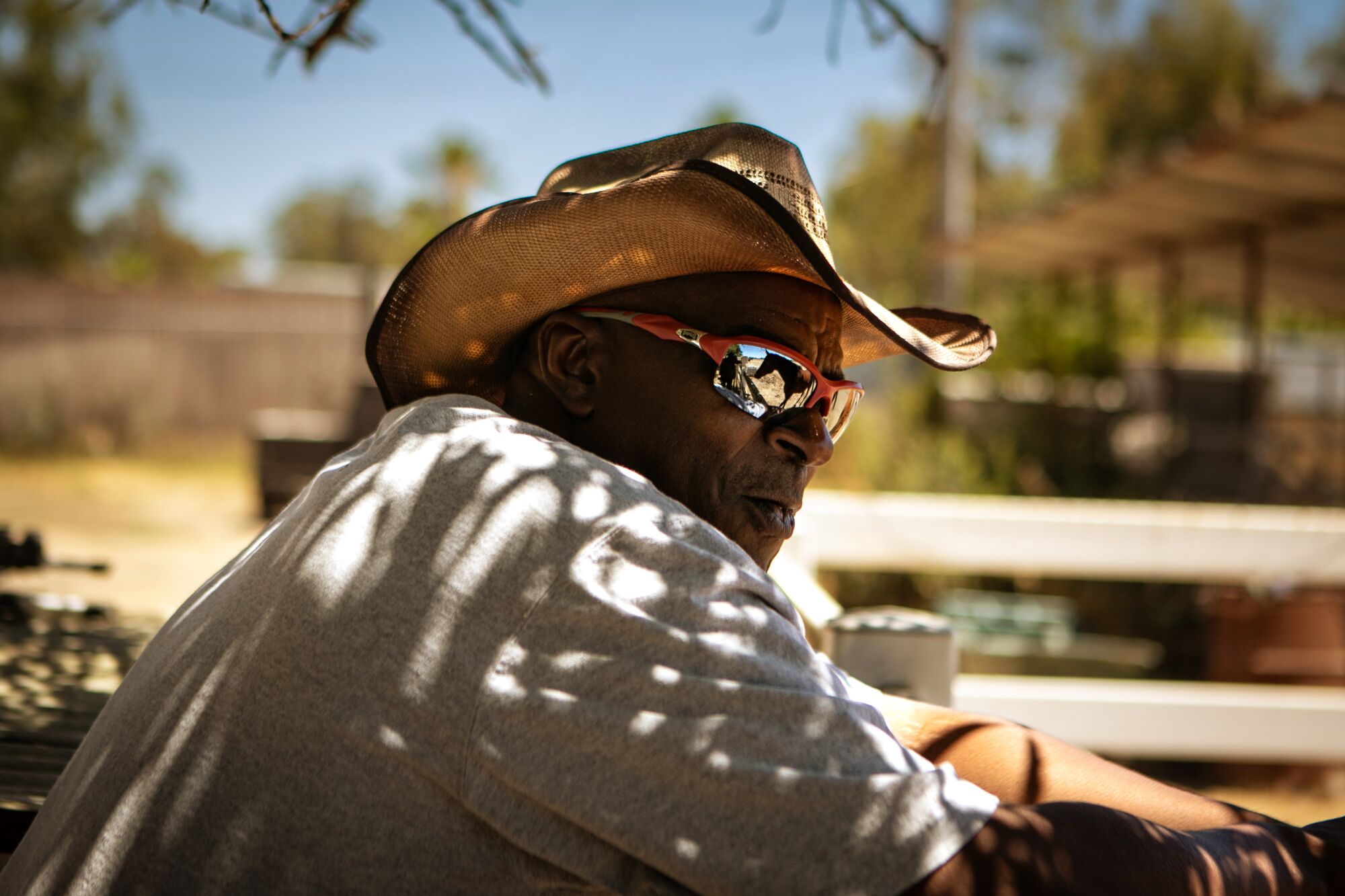
Troy Jackson of the Wiltown Riders checks on the horses at his ranch exterior Sacramento. “Once we get on these dang horses and we take off, bro — you’re speaking a couple of freaking pleasure,” he says.
(Jason Armond / Los Angeles Instances)
One of many household’s horses, Jellybean, approaches to nuzzle my neck after I transfer in to take a selfie.
The solar casts shadows of palms on the fishpond as extra membership members arrive of their boots and hats. Gatherings are held potluck-style, with sufficient free barbecue, grilled steaks and potato salad for everybody.
Later, Brooke Jackson, Troy’s cousin, wows the group by balancing atop Jellybean on two ft.
To provide me a glimpse of the American West from their vantage level, a member loans me her Jack Daniel’s cowboy hat, and on the group’s insistence, I hoist myself onto Jellybean for a shock trip.
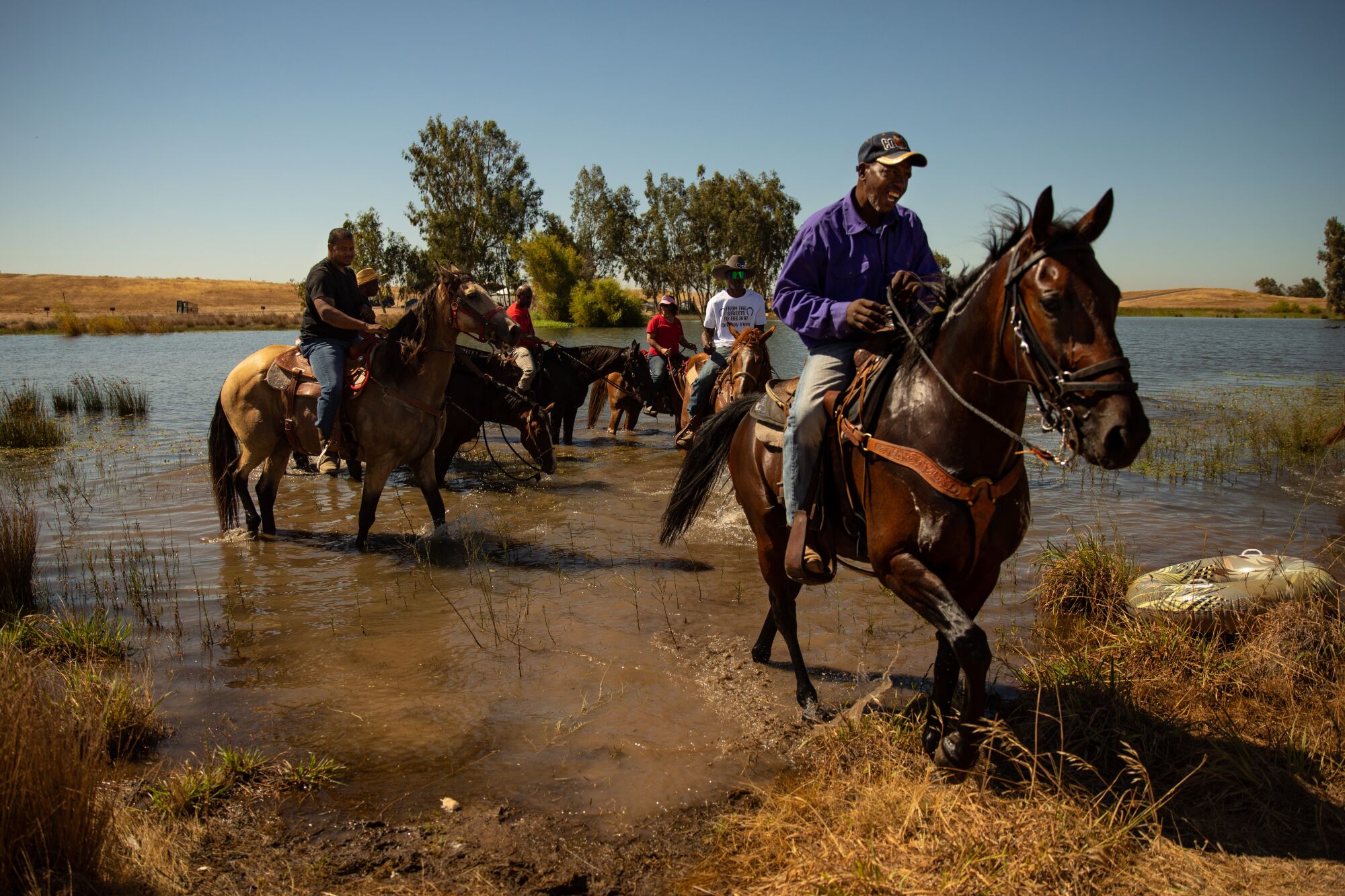
Riders let their horses cool off within the water at Woodward Reservoir in Oakdale after a protracted path trip.
(Jason Armond / Los Angeles Instances)
“Tip your hat! Tip your hat!” they shout as I faucet my heels towards Jellybean’s sides to start out my journey. I oblige, mustering the entire panache of the fictional cowboys I’d grown up watching on TV.
Everybody bursts into laughter and cheers as one of many Wiltown Riders leads us into the sundown.

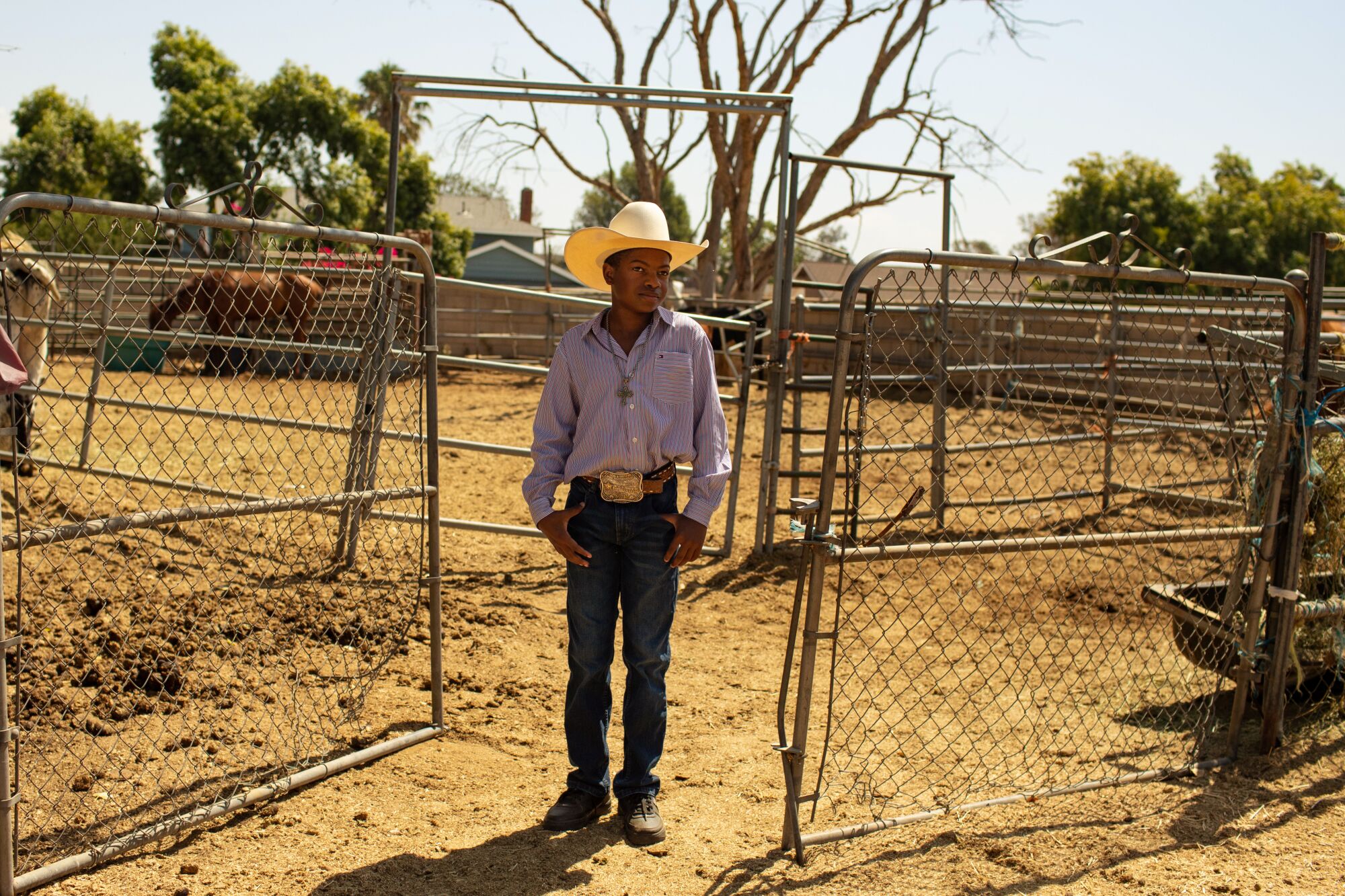
Andrew Jennings in his yard in Jurupa Valley, Calif., the place he trains on bulls and horses. The 12-year-old desires of changing into a family title within the rodeo world.
(Jason Armond / Los Angeles Instances)
Nearer to L.A., Jennings instills western traditions otherwise — by serving to his son understand his dream of changing into a family title within the mainstream rodeo world.
The household’s unassuming one-story residence appears to be like just like others on this residential block, however the yard is sort of all dust and steel corrals. The slight funk of manure seasons the air. Horses and bulls idle within the sizzling solar.
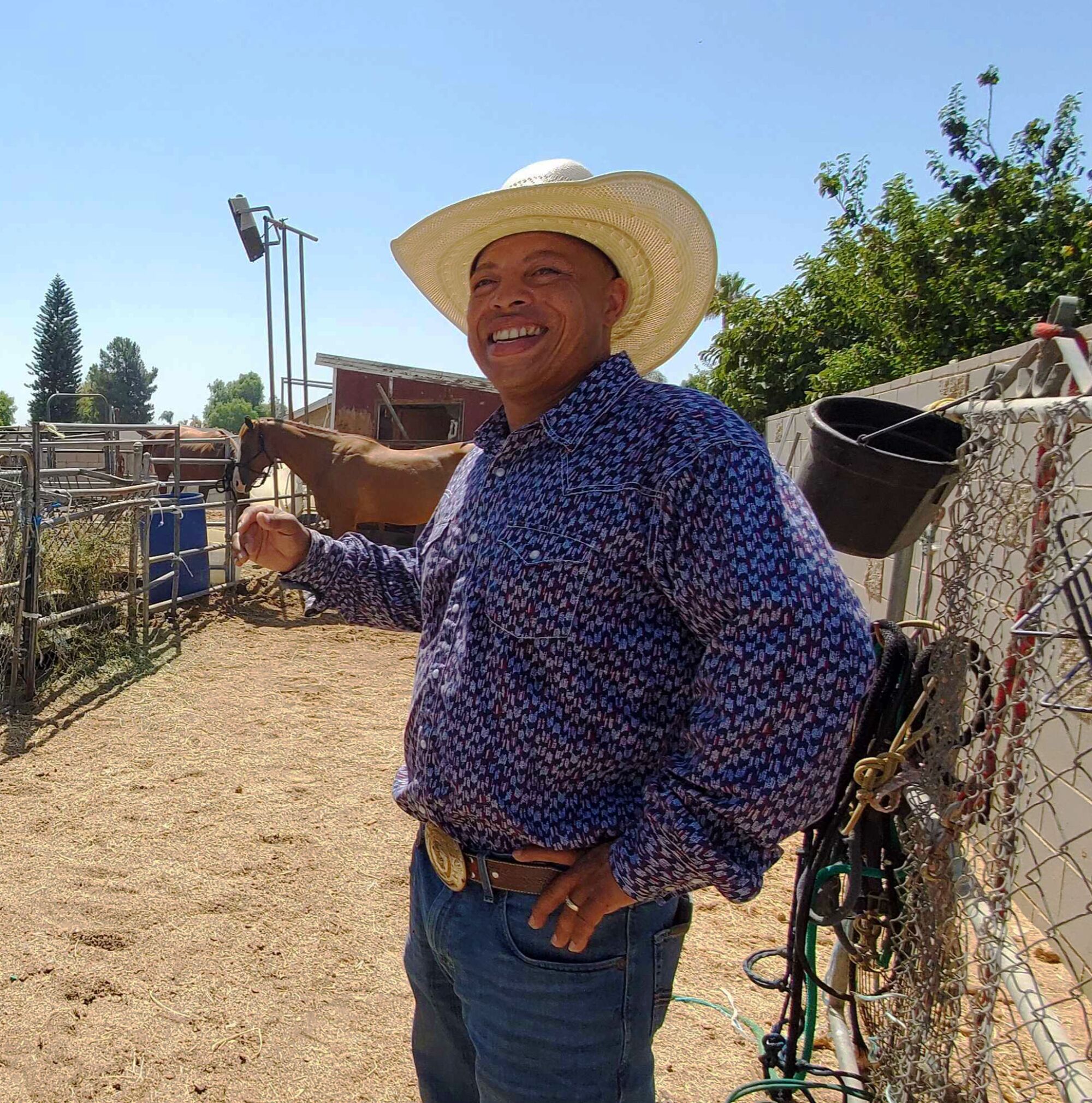
Ron Jennings doesn’t wish to burden his kids with classes on the historical past of racism in rodeo. “We concentrate on simply being a cowboy, plain and easy,” he says.
(Tyrone Beason / Los Angeles Instances)
Andrew practices on the youthful, lighter-weight bulls each time he likes. Along with his cowboy hat pulled low over his face, he flashes the slightest grin whereas displaying the engraved world championship buckle he gained at a peewee league bull driving event in 2020.
Jennings says he doesn’t wish to burden his kids with classes on the game’s historical past of racism. The Invoice Pickett Invitational Rodeo is the one such occasion the household attends. I watched Andrew compete in Las Vegas final yr, in addition to on the rodeo in Metropolis of Trade in July.
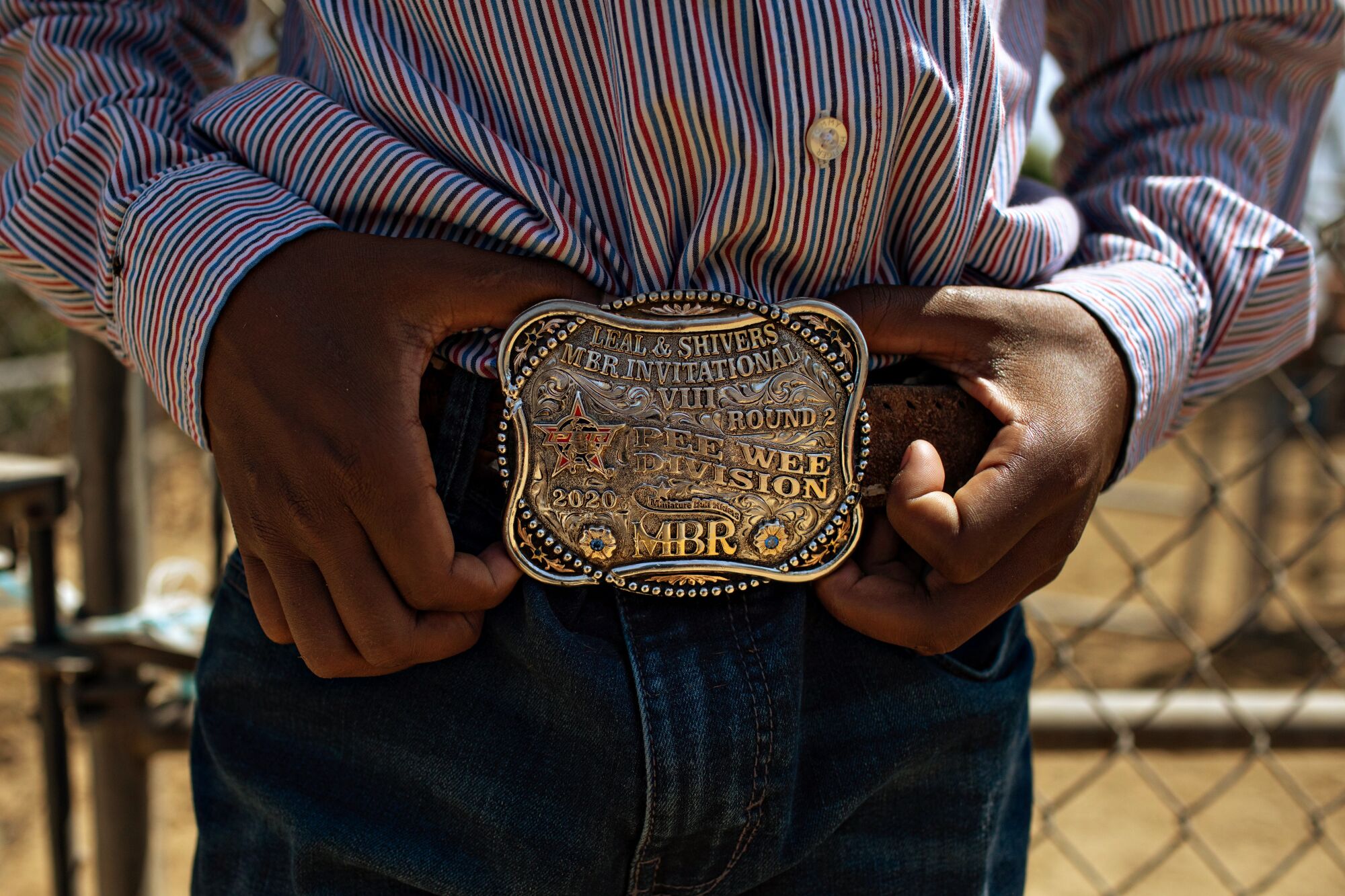
Andrew Jennings exhibits off the youth rodeo world championship buckle he gained in 2020.
(Jason Armond / Los Angeles Instances)
“I nonetheless take them again, to allow them to see their individuals,” Jennings says of these outings. “However we concentrate on simply being a cowboy, plain and easy.”
There’s nothing “plain and easy” about being Black in America, but Jennings’ perspective rings true within the democratizing discussion board of a rodeo area.
Horses and bulls don’t care concerning the shade of your pores and skin or what number of arduous knocks you’ve suffered. All of it comes all the way down to a check of power, stability and emotional fortitude.
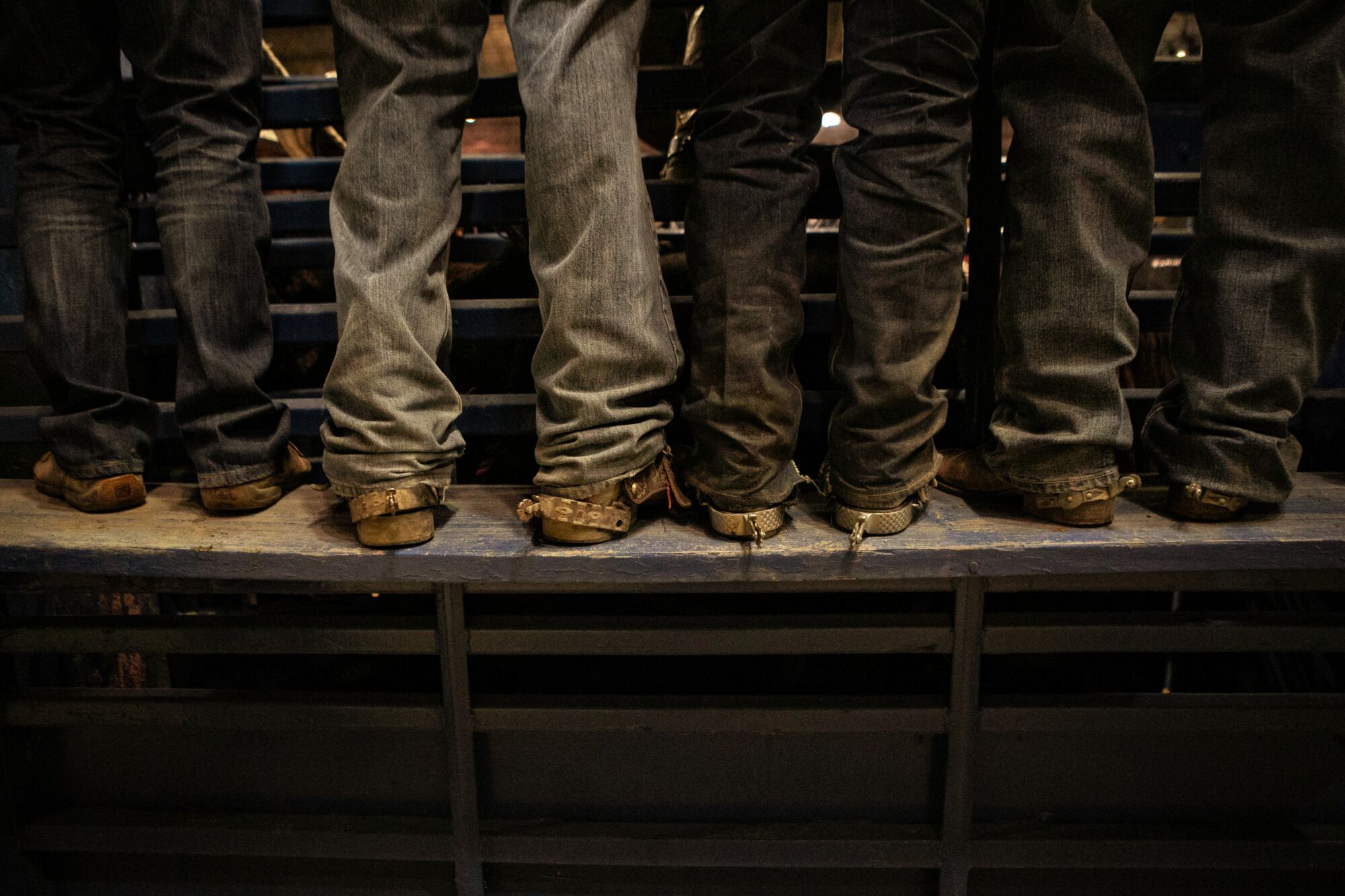
Younger Black bull riders stand towards a chute as they assist a competitor settle onto a bull.
(Jason Armond / Los Angeles Instances)
Jennings drives Andrew to rodeos within the Navajo Nation, and to others the place most opponents are both white or Mexican American. The household invitations me to look at Andrew at his subsequent youth rodeo in San Bernardino, this one organized and emceed by Jennings.
There isn’t any soul music at this rodeo — and no anthems extolling Black satisfaction. Nation and western songs blare from audio system for a smattering of individuals holding tailgate events.
The pint-size opponents line up of their chaps and take away their hats for a prayer and the enjoying of “The Star-Spangled Banner.” Andrew is certainly one of two Black riders amongst his largely Latino and white friends.
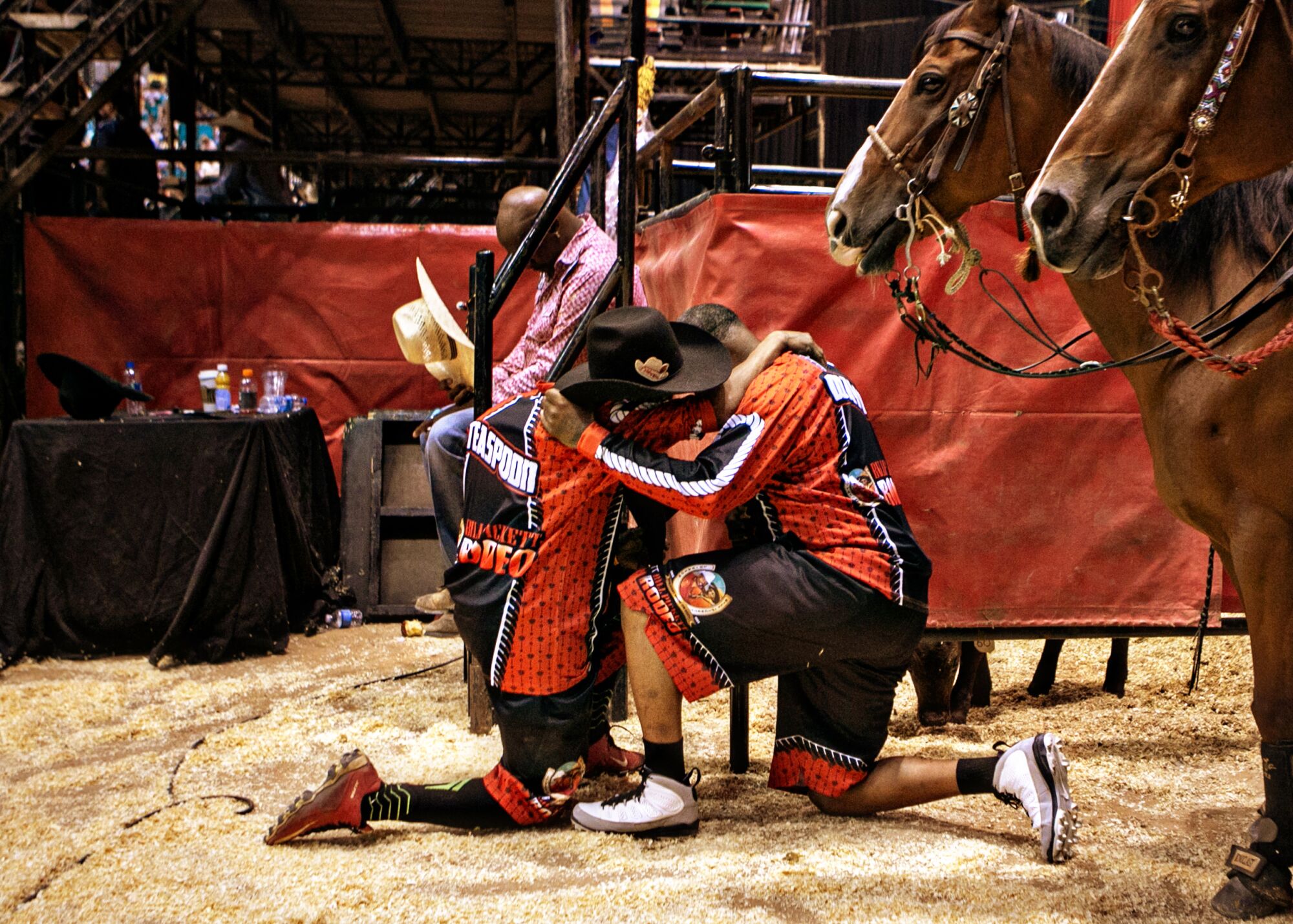
Bullfighters share a fast prayer earlier than coming into the sector in Las Vegas, the place they’ll distract the bulls as soon as their riders are bucked off.
(Jason Armond / Los Angeles Instances)
He stands on rails in one of many chutes and tightens ropes round his bull. His mom, Kizzy Jennings, and youthful sister, London, watch from the sidelines.
When it’s Andrew’s flip, nation singer Tracy Lawrence’s “Sticks and Stones” drifts over the sector as Jennings shouts encouragement on the microphone: “You’re going for the second proper right here, Andrew!”
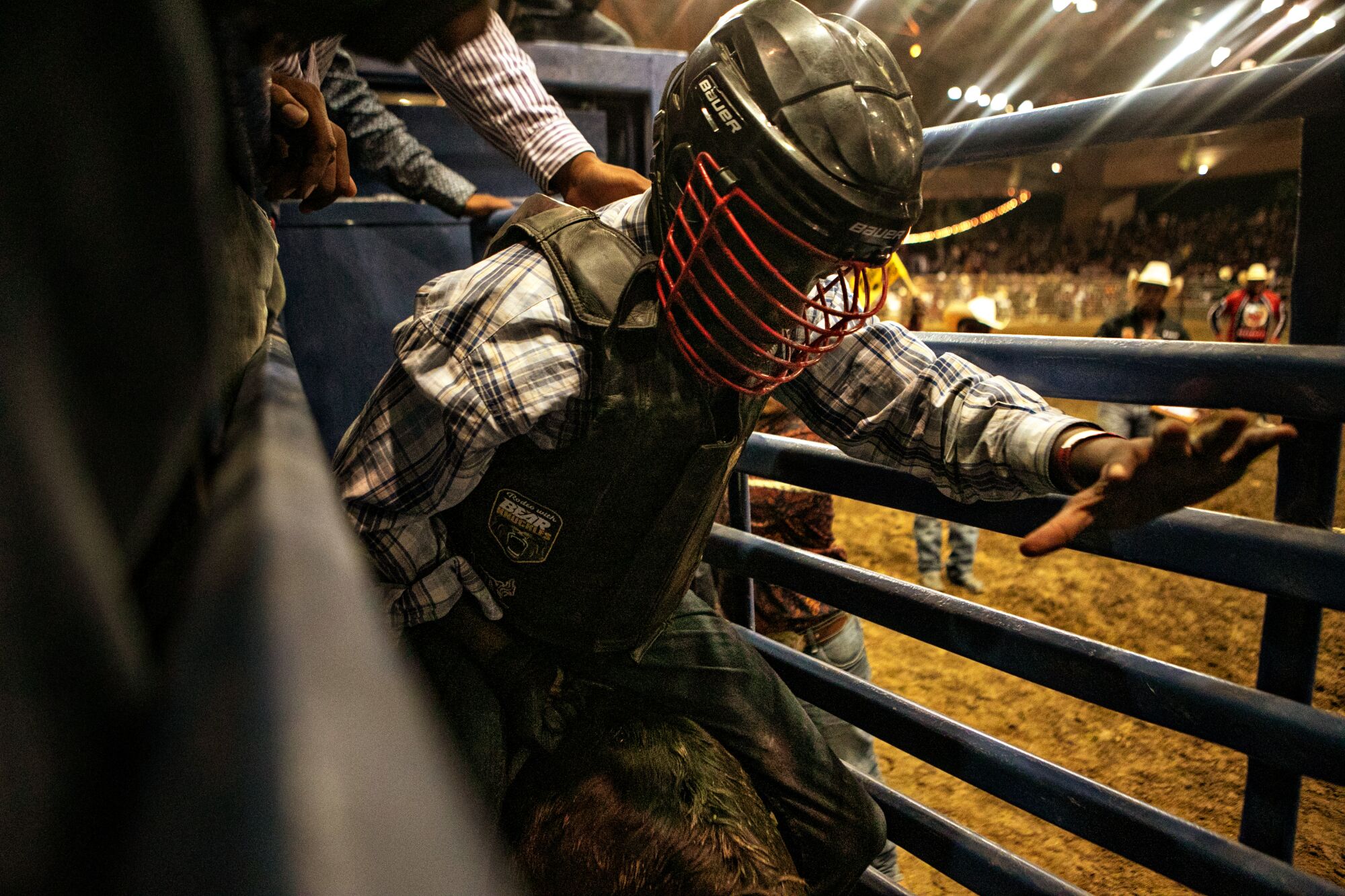
Andrew Jennings settles onto his bull earlier than it bolts out of its chute at July’s Invoice Pickett Invitational Rodeo in Metropolis of Trade.
(Jason Armond / Los Angeles Instances)
The bull costs out of the gate, kicking up its hind legs in an try to fling Andrew off. However Andrew retains his cool for 5, then 10, then 15 seconds, extending one hand within the air because the bull bucks and turns.
Andrew appears to be like solely mildly happy along with his exhibiting.
“If I used to be to get a greater bull, I really feel like I might’ve executed higher,” he says moments later, catching his breath.
Andrew’s willpower to turn into a rodeo star drives residence an thought that everybody who opened their lives to me expressed in some trend: The tradition of the West has by no means been white America’s alone. For Black Individuals, this way of life is all of the extra empowering as a result of it connects us to a historical past that many people are solely starting to study.
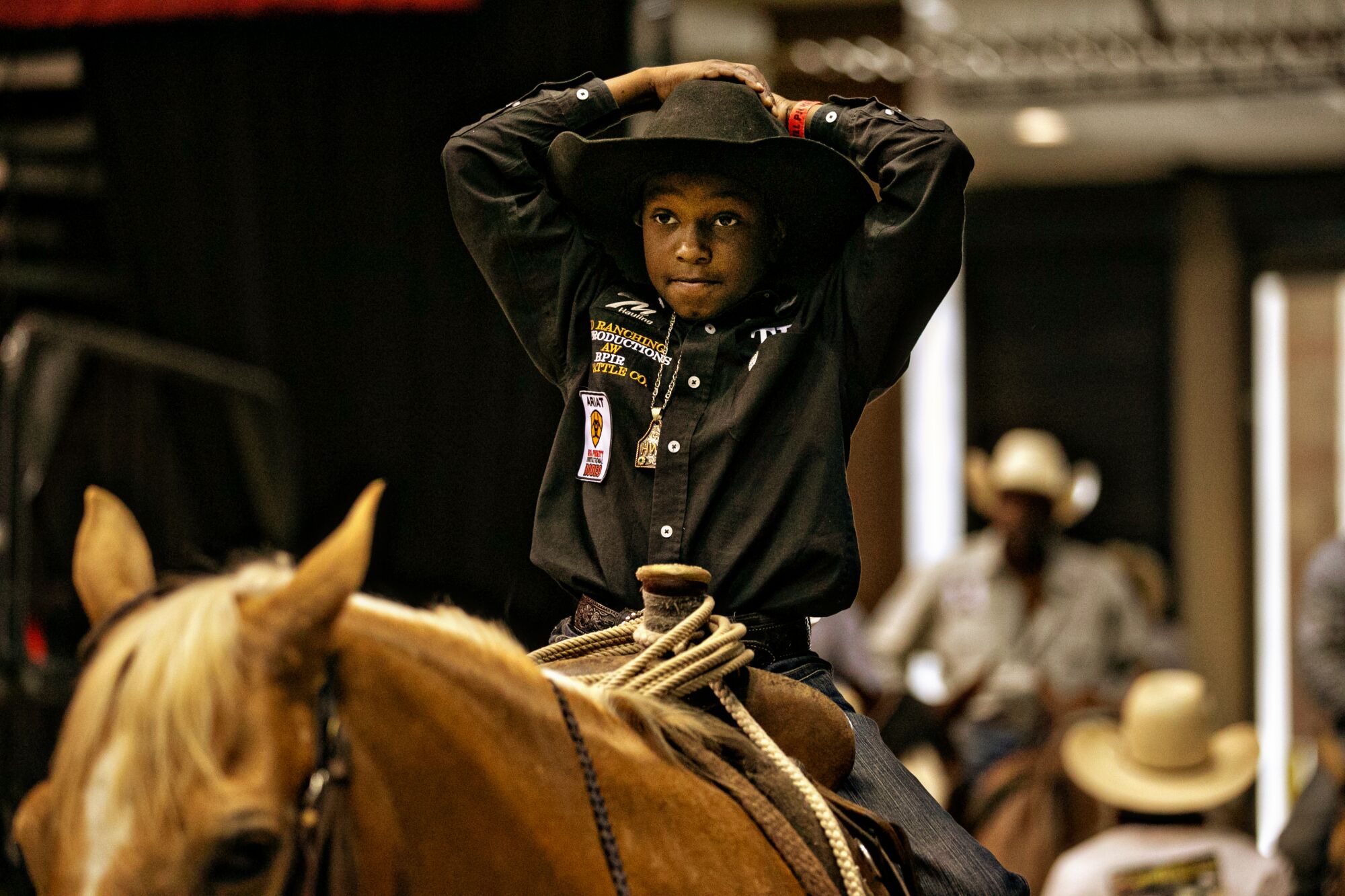
Harrel “Junebug” Williams Jr. of Hempstead, Texas, waits his flip to compete at a rodeo in Las Vegas.
(Jason Armond / Los Angeles Instances)
After I was Andrew’s age, I couldn’t think about being a cowboy.
I really feel grateful to be right here to witness him doing what he loves, as a result of I do know that each time he photos a cowboy in his thoughts, he’ll see himself.
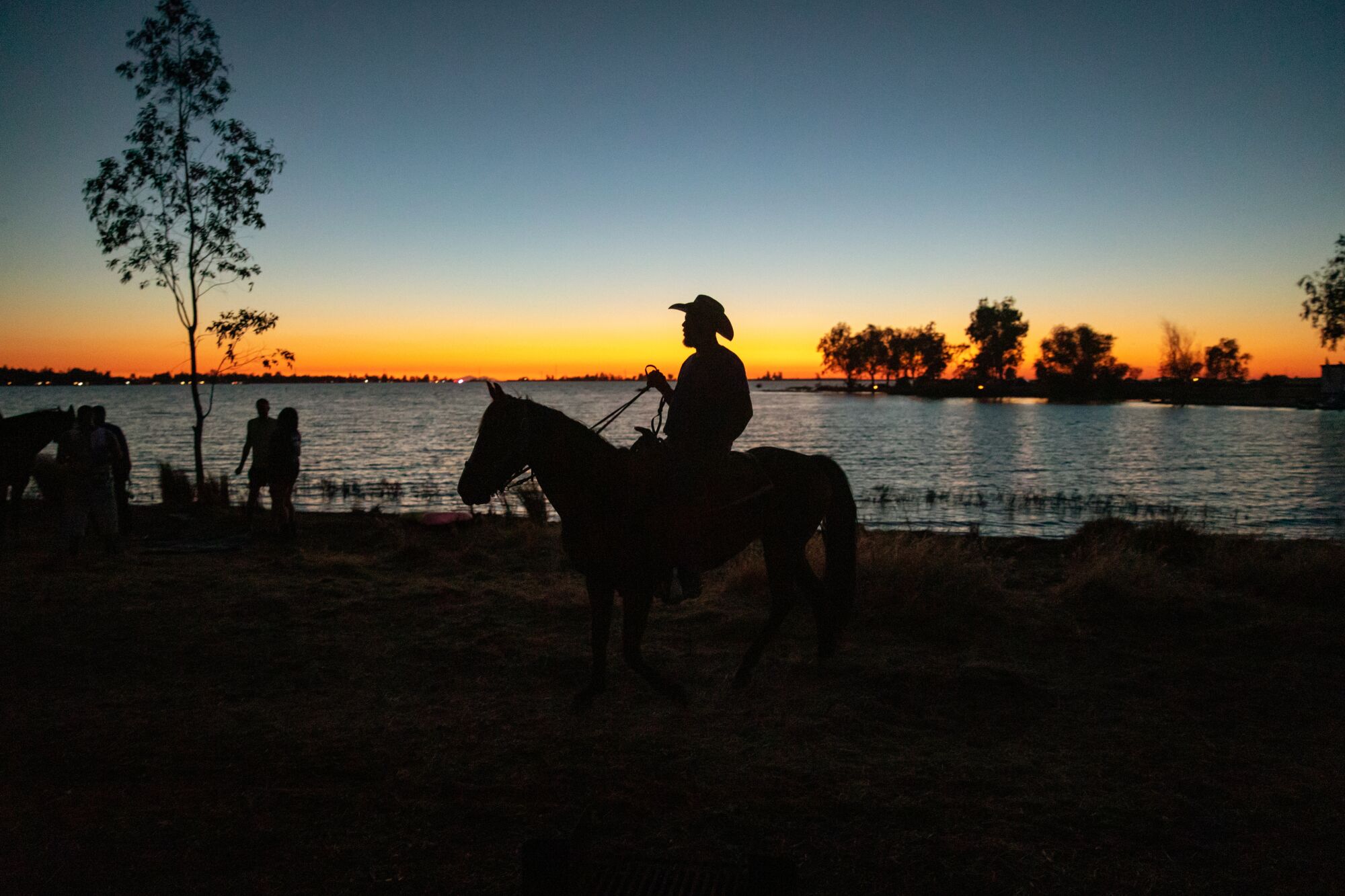
Freddy Perres watches the sundown by the water’s edge throughout a summer season campout exterior Oakdale. Having moved along with his spouse and youngsters to a horse ranch exterior Sacramento, he says he’ll by no means dwell within the metropolis once more.
(Jason Armond / Los Angeles Instances)

